








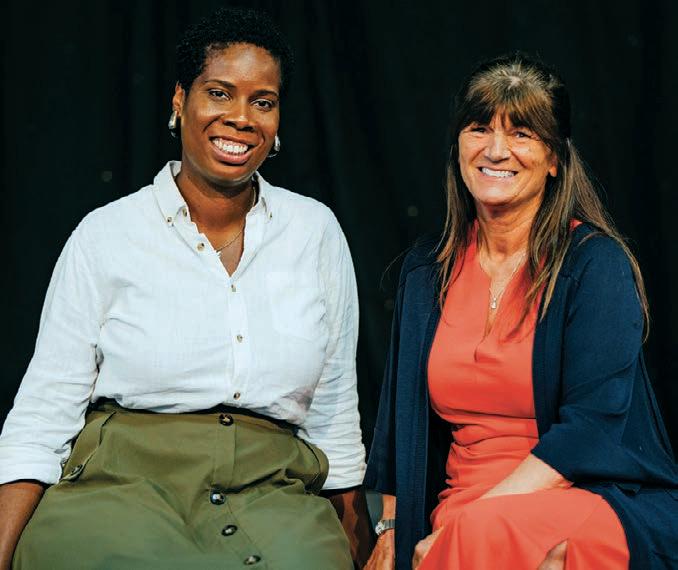
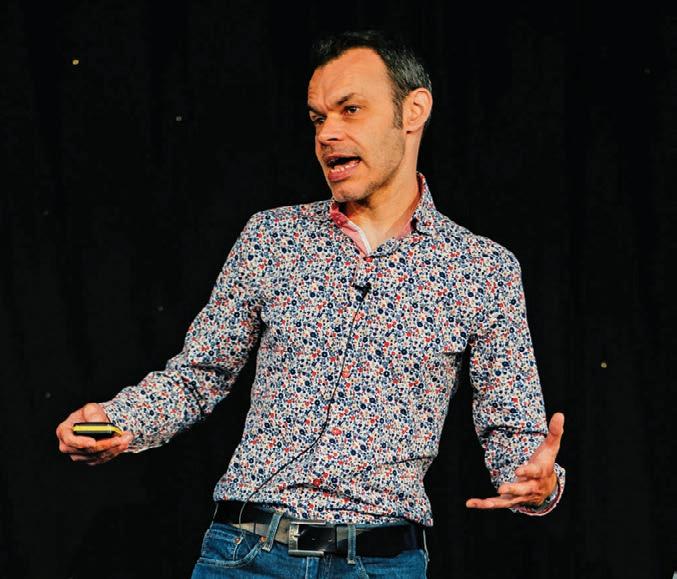















INTERVIEW
NEW-LOOK BUSINESS SCHOOL WILL HAVE SO MUCH TO OFFER POLITICS
CHAMBER REACTS TO COMPREHENSIVE SPENDING REVIEW



There’s lots going on in this summer edition of Business Network. Events-wise we have some great images from the 2025 Enterprising Women Summer Networking Event –expertly snapped by our photographer Pete Martin. The day, in the opulent setting of The Tipis at Whatton House, was a roaring success and included the announcement of the finalists in this year’s 2025 Enterprising Women Awards.
The actual awards night takes place on 26 September at Winstanley House, Leicester, and you can find ticket details on page 39.
There’s also a plug for the 2025 Generation Next Awards, which take place in Derby just as Business Network goes to press – pictures from that in our next edition – and we have an interesting report from the recent Leicester meeting of the East Midlands Manufacturing Network, at De Montfort University.
We dedicate two pages to the Chamber’s AI and Digital Marketing Conference, which was held in Nottingham, and had fascinating expert speakers exploring everything from how AI is already affecting the way we search online to how it can be used to create impactful marketing. Also in the events world, if you turn to page 42, you can find the details for entering the 2025/26 East Midlands Chamber Business Awards – which will take place early next year in Nottingham, Derby and Leicester. Don’t be fooled into thinking they’re a long way off – entries need to be submitted by 19 September at: www.emcdnl.co.uk/services/business-awards.
There’s also coverage of the Government’s recent spending updates, including plenty of positive news for the small modular reactor and nuclear submarine divisions of Rolls-Royce, as well as £2.5bn for nuclear fusion including the STEP programme at West Burton, in Nottinghamshire. One day that could unlock limitless clean power – truly world-changing stuff.
Coming up, the 2025 East Midlands Chamber Sustainability and CSR conference takes place at the University of Derby on 11 September. To tie-in with that, our Focus pages this month have a CSR theme, while our Big Interview is with the head of the university’s business school, Dr Nicola Lynch. She explains how the £75m-plus investment in a new home for the school – set to open soon – will combine world-class academic facilities with a commitment to social value, sustainability and community impact. It’s going to be big news for the city, and the university.
I hope you enjoy the read.
Tom Pegden, Editor, Business Network

Editor Tom Pegden
T: 07816 347 451
E: tom.pegden@emc-dnl.co.uk
Contributor Tim Smith
Chamber Membership
E: membership@emc-dnl.co.uk
Follow the Chamber
W: www.emc-dnl.co.uk
Twitter: @EMChamberNews
The Chamber’s AI and Digital Marketing Conference and Exhibition 2025
Pictures by Simon Smith from JAKT Photography
See pages 34-35
PRIVACY NOTICE Kemps Publishing Ltd process personal information for certain legitimate interest purposes, which includes the following:
• To provide postal copies of this publication to Chamber members and Kemps’ customers; and
• To offer marketing and promotional opportunities within this publication to Chamber members and prospects.
in this regard.
Publishers Kemps Publishing Ltd 8, The Courtyard, 707 Warwick Road, Solihull, B91 3DA
T: 0121 765 4144
w: www.kempspublishing.co.uk
Managing Editor Laura Blake T: 0121 765 4144
E: laura.blake@kempspublishing.co.uk
Designer Lloyd Hollingworth
Advertising T: 0121 765 4144
E: andy.baker@kempspublishing.co.uk
Printers Stephens & George Print Group W: www.stephensandgeorge.co.uk
BUSINESS NETWORK is produced on behalf of East Midlands Chamber (Derbyshire, Leicestershire, Nottinghamshire) by Kemps Publishing Ltd and is distributed to members without charge. The Chamber and the publisher are committed to achieving the highest quality standards. While every care has been taken to ensure that the information it contains is accurate, neither the Chamber nor the publisher can accept any responsibility for any omission or inaccuracies that might arise. Views expressed in the magazine are not necessarily those of the Chamber. This publication (or any part thereof) must not be reproduced, transmitted or stored in print or electronic format without prior
JULY/AUGUST 2025
MEMBER NEWS
4 Rolls-Royce to build modular reactors
APPOINTMENTS
22 New chief executive for Space Park
THE BIG INTERVIEW
25 Dr Nicola Lynch, head of Derby Business School
STRATEGIC PARTNERS AND PATRONS
30 Agency teams up with well-known artist
CHAMBER NEWS
32 Funding boost for Accelerator project
CHAMBER NETWORKS
38 Shortlist unveiled for this year’s Enterprising Women Awards
TRAINING & EVENTS
42 Entries encouraged for East Midlands Chamber Business Awards 2025/26
SUSTAINABLE EAST MIDLANDS
44 East Midlands Investment Zone completes first year of grants for green businesses
INTERNATIONAL TRADE
46 Lighting specialist overcomes Trump tariffs to retain installation business in US
POLITICS
48 Chamber gives cautious welcome to Chancellor’s spending review
FEATURES
50 WORKFORCE DEVELOPMENT
Hearing the concerns of employees
55 The benefits of strategic staff planning
58 FOCUS
Business Network rounds up the CSR activity of some of the region’s top businesses
64 REGENERATING THE EAST MIDLANDS
The basics of urban regeneration
67 Building on brownfield land
DIGITAL & TECHNOLOGY
70 How to make AI work for you
BUSINESS SUPPORT
73 LEGAL
Major review of the law on wills
74 FINANCE
Team helps tech sale go smoothly
76 SKILLS
Design students bring kids’ monsters to life
78 PROPERTY
New tenant at Leicester’s Dock workspace
80MOTORING
Nick Jones runs the rule over Nissan’s new hybrid Juke
THE LAST WORD
82 Chamber president Dawn Whitemore on the challenges and rewards of CSR activity



Rolls-Royce SMR has been selected as the preferred bidder by Great British Nuclear (GBN) to build three small modular reactors (SMRs) in the UK. The mini nukes will use a nuclear reaction – like traditional nuclear power stations – to generate heat to drive a turbine and produce electricity. They would have about a third of the capacity of traditional nuclear power reactors, with each one expected to produce enough stable, affordable, emission-free electricity to power a million homes for at least 60 years.
Rolls-Royce SMR, which has secured £2.5bn for the plans through the recent Government Spending Review, said the programme would lead to thousands of jobs.
Chief executive Chris Cholerton said: “This success is testament to our incredible team which has developed a world-leading technology and worked tirelessly over the last two years to ensure we could provide a winning tender to GBN.
‘A vote of confidence in our unique nuclear capabilities’
“We are the only SMR company with multiple commitments to build projects in Europe, testament to our differentiated design and compelling offer.”
Rolls-Royce PLC chief executive Tufan Erginbilgic said: “It is a vote of confidence in our unique nuclear
Rolls-Royce Plc’s Derby operation will benefit from a share of a £15bn Government investment in the UK’s sovereign nuclear warhead programme, with up to 12 new attack submarines set to be built as part of AUKUS programme.
Responding to “rapidly increasing global threats” the Government said nuclear investment under the Strategic Defence Review will support 30,000 highly skilled jobs up-and-down the country and double apprentice and graduate roles over the next 10 years.
Committing to the Royal Navy’s Continuous At Sea Nuclear Deterrent it said the current seven Astute Class attack submarines will be replaced with up to 12 SSN-AUKUS submarines from the late 2030s, leading to a big investment at Rolls-Royce’s headquarters in Raynesway, Derby and its support operations at Barrow in Scotland.

capabilities, which will be recognised by governments around the world. It is also evidence that the strategic choices we have made in the transformation of RollsRoyce are delivering. I believe the value of Rolls-Royce SMR will grow materially from here as we successfully execute and deliver on the potential of this venture.”
Chamber chief executive Scott Knowles said: “I’m delighted RollsRoyce SMR will be able to take this forward. Investment in the development of clean energy projects in the East Midlands will be of significant benefit to the economy for Derby, Derbyshire and the wider region though the supply chain and the resulting employment it will bring.”
Great British Energy – Nuclear hopes to allocate a site later this year and wants to connect the projects to the grid by the mid-2030s.
The International Energy Agency estimates the global SMR market could reach almost £500bn by 2050, with Britain now having a competitive advantage.
It also estimates that global electricity demand will double by 2050.
Rolls-Royce SMR has already been selected by European utility company ČEZ to deploy SMR technology in the Czech Republic.
See our Comprehensive Spending Review report on page 48.
1Energy carrying out extensive piping work




East Midlands Chamber has commenced an exclusive strategic partnership with Nottingham Trent University (NTU).
Under the deal, the multi-awardwinning university, with more than 36,000 enrolled students, will be able to use its insight to help shape policy with the East Midlands business community, joining Chamber discussions with leaders and decision-makers.
It will also be a partner of Generation Next – the Chamber network aimed at inspiring future leaders, entrepreneurs and young professionals in the 18-35 age bracket. NTU has supported students and graduates to create more than 500 new businesses since 2001, with more than 85% of them surviving for more than three years.


Named ‘University of the Year’ five times in six years by multiple bodies, awards and rankings gained by Nottingham Trent University in recent years include 1st in UK for Employability (Uni Compare 2025), Best University in the UK (Uni Compare 2025), GOLD in the 2023 Teaching Excellence Framework
Plans to heat 47 substantial Derby buildings with low-cost, recycled energy have received £23.2m of Government backing.
1Energy has won funding from the Green Heat Network Fund to install water source heat pumps to harness waste heat from businesses and other buildings in the Spondon area.
A network of underground, water-filled pipes – backed-up by thermal stores and a gas boiler system – will eventually connect to buildings, which could potentially include the University of Derby, Derby College, the city council and University Hospitals Derby and Burton NHS Foundation Trust.
The project – which could lead to 100 new jobs – is one of eight low carbon heat networks across the UK to get a share of £100m of government investment. It will be supported by millions in private sector investment.
Over the last 15 years 1Energy has helped create more than 50 low-carbon district heating projects in the UK.
Chief executive Andrew Wettern (pictured) said: “Derby is known as a pioneering city, from the first mechanised factory in the world to modern engineering giants. 1Energy is excited to develop a landmark low carbon heat network in Derby which will future-proof the city for generations to come, offering sustainable, affordable, locally generated heat across the city.”

Nick Johnston, who is the project director at 1Energy Group, said: “We have had a very supportive reception from public sector and business leaders in the city who share our vision for cleaner energy, generated locally.”
A University Hospitals of Derby and Burton NHS Trust spokesperson said the project could eventually see two city hospitals provided with pre-heated water, significantly cutting how much gas they use and offering one of the most cost-effective heating solutions available.
(TEF) assessment, and The most sustainable university in the UK and 2nd in the world (UI Green Metric University World Rankings, 2024).
Chamber chief executive Scott Knowles said: “Engaging with leading education providers is conducive to growth, helping provide insight through research and building the workforce of the future.
“I look forward to furthering our longstanding collaboration with Nottingham Trent University and the benefit that strategic partnership will bring, whether at the table with policymakers, addressing shared challenges and opportunities for the region or in partnership with Generation Next –the Chamber’s network for young professionals.”
Professor Sarah Speight, NTU’s deputy vice-chancellor and provost, said: “We value the chance to build on our relationship with the East Midlands Chamber through this strategic partnership.
“At Nottingham Trent University, we believe that strong collaboration with business isn’t just important – it’s essential.”
Amazon could deliver 4,000 jobs to region

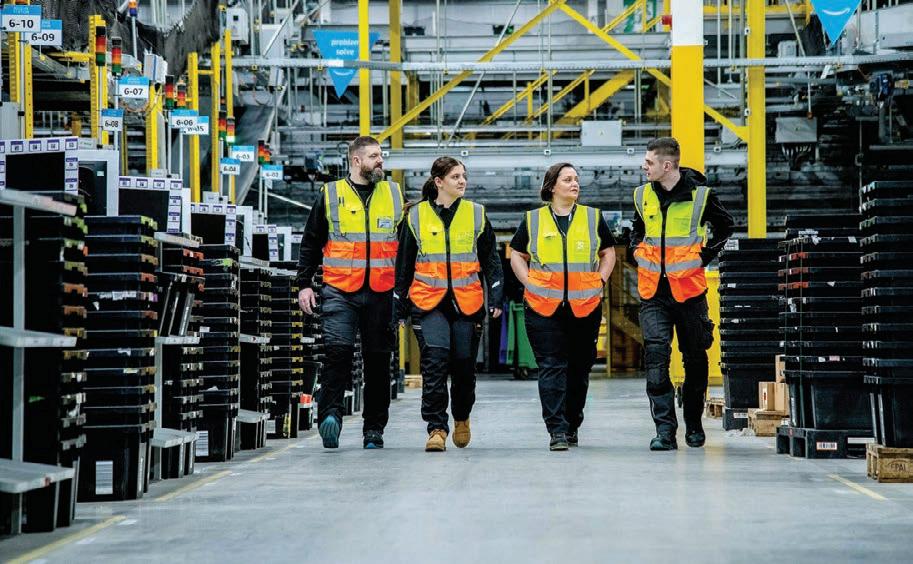

Amazon is planning around 4,000 new jobs in the East Midlands as part of a £40bn countrywide investment that will take in new and existing sites, AI data centres, drone technology and movie facilities.
The global retail giant is planning to open two new East Midlands fulfilment centres by 2027 – at undisclosed locations – alongside similar new facilities in Hull and Northampton.
It already has a number of big East Midlands warehouses, including at East Midlands Gateway, Sutton-in-Ashfield, Coalville, Magna Park and Hinckley.
The UK-wide investment will also cover upgrades and expansion of more than 100 existing operations buildings across the country, as well as £8bn for cloud computing
and AI infrastructure to support UK businesses.
Amazon already employs more than 75,000 people in the UK having invested more than £75bn here over the last decade.
The new £40bn investment will also cover two new buildings at its East London corporate HQ; improvements to its delivery service; new training programmes; the UK’s first Prime Air drone deliveries in Darlington; R&D sites for AWS, Prime Video, Music, Games, Alexa; and money to redevelop the historic Bray Film Studios in Berkshire for original Amazon TV and film productions.
Prime Minister Keir Starmer said: “Amazon’s £40bn investment adds another major win to Britain’s basket and is a massive vote of confidence in the UK.”

A business that makes packaging machinery for medical devices has relocated to a purpose-built 27,000 sq ft headquarters in Castle Donington.
Shawpak has taken the unit on the Stud Brook Business Park giving it the “scale, specification, and strategic location” to support its longterm growth plans.
Since its launch in Derby in 2013, Shawpak has become a global player in the design and manufacture of specialist packaging equipment
The new site places it just minutes from East Midlands Airport and junction 24 of the M1 and will see around 50 staff relocate from its previous site in Allenton, Derby.
Operations director Alan Wade said: “The new facility not only gives us the space and resources to grow, but it also reflects the forwardthinking, high-spec approach we take in everything we do. We're proud to continue our journey here in the East Midlands.”
The team was helped by NG Chartered Surveyors and Clowes Developments.

The University of Derby in Kedleston Road
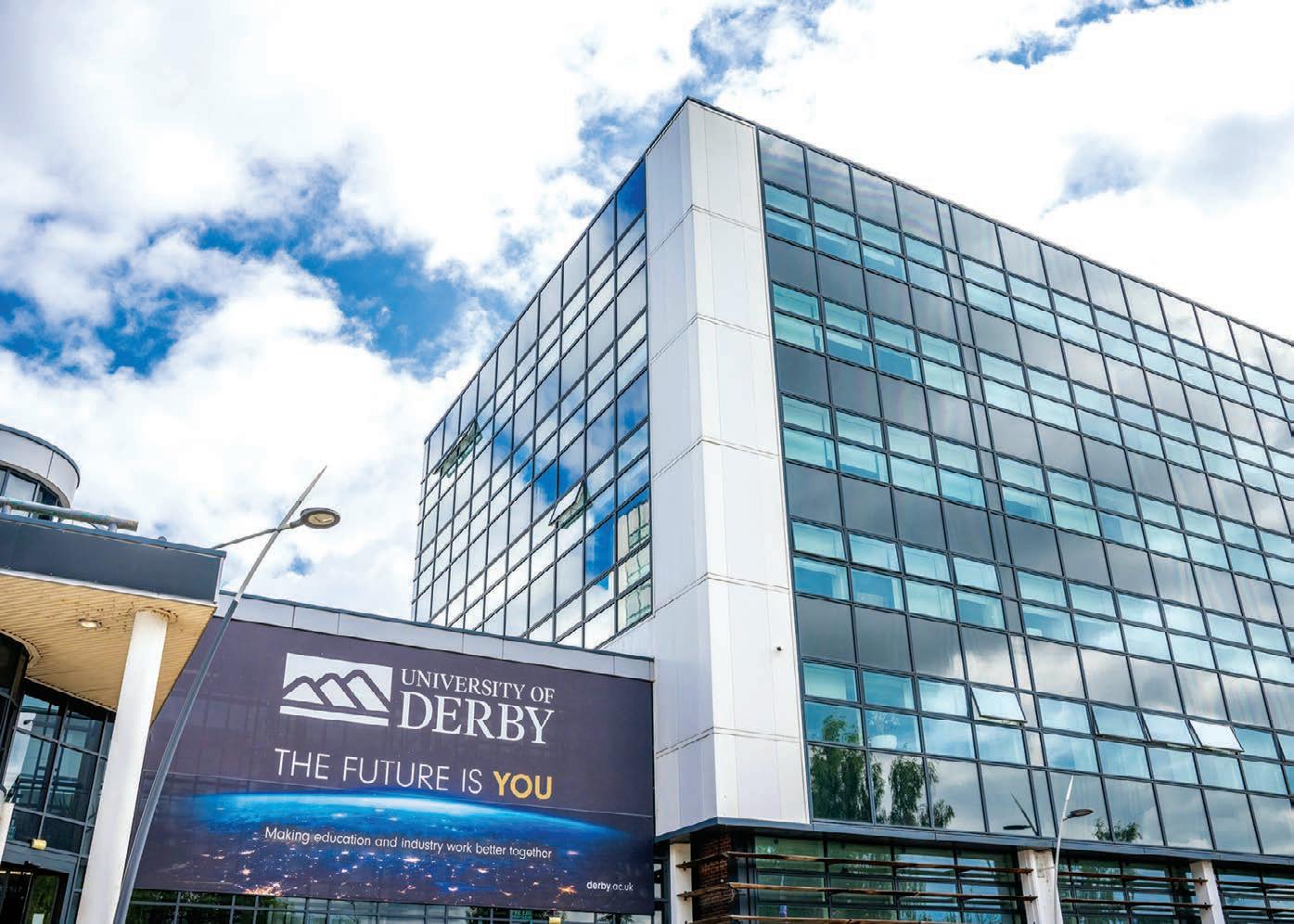

Some of the University of Derby’s most promising students have been recognised through the East Midlands Chamber’s 2025 Future Leaders Awards.
The awards celebrate students who have gone above and beyond in their academic studies and in showing outstanding potential for their future career paths.
This is the third year that the Chamber has supported the awards and each student will now meet one of the Chamber’s senior management team to discuss ways in which it can support them in their career aspirations.
Chamber director of resources

‘We’re recognising the students who have gone above and beyond’
Lucy Robinson said: “We’re recognising the students who have gone above and beyond and as a reward for their achievements, the Chamber offers them support including free access to the Generation Next network, invitations to our conferences and the chance to network with potential employers.
“Each of them has done something that stands out, and I’m looking forward to meeting them to
find out more about what they have done and to talk to them about how the Chamber can help them.”
The winning students from those nominated this year were Kiera Harber, who is studying creative expressive arts, health and wellbeing; mechanical engineering undergraduate Tobias Cartner; Sanjay Lakhani, who is doing a degree in international hospitality management; psychology students Katie Dutton and Sarah Timms; Derby twins Sam and Alex Bolton, who were born with spinal muscular atrophy and are both studying film and high-end television; and digital marketing student Aimee Barnes.

The Chamber’s Enterprising Women group is hosting a networking lunch at The Peacock at Rowsley, in the Peak District, from noon-2pm on 17 July.
It will be a chance to connect, share, and network in an elegant and inspiring setting over an enjoyable afternoon tea made with locally-sourced ingredients.
Chamber events officer Emily Perkins said: “Whether you’re looking to grow your network,

spark new collaborations, or simply spend time among like-minded women in business, this afternoon promises connection, conversation, and inspiration.
“We warmly invite you to join us for what promises to be a memorable and uplifting event in one of Derbyshire’s most treasured locations.”
To book visit: is.gd/N7DWh4

Nottingham Business School’s (NBS’s) commitment to supporting businesses, fostering entrepreneurship and driving economic growth has been recognised with reaccreditation from the Small Business Charter (SBC) for the maximum five-year period.
The accreditation examined 30 points with NBS achieving outstanding performances across all elements.
The business school is triple crown accredited by EQUIS, AACSB, and AMBA – globally recognised hallmarks of excellence and quality for business education.
Its commitment to enterprise has led to the delivery of more than £10m in funded projects, supporting more than 1,500 SMEs.
Nottingham Business School Postgraduate Centre

Twycross Zoo has revealed plans for a £25m Global Conservation Centre – to help its work fighting global animal extinction.
Backed by an £18m investment from the UK Government – the biggest single government grant ever given to a UK zoo – it will be a hub for the zoo’s expanding global conservation work, scientific research and education programmes – as well as a community space to inspire and train the next generation of conservation leaders.
The centre is being developed in partnership with Hinckley & Bosworth Borough Council and eight UK universities and will tie-in with the creation of a new Indonesian-themed area within the zoo, including a Bornean orangutan habitat and space for other threatened Indonesian species. It will also highlight the threats Indonesian wildlife faces from human activity.
The Global Conservation Centre fits in with the zoo’s 2030 conservation strategy, which has
Architect’s impression of the Global Conservation Centre

committed it to reversing the red list status of 15 species – including the four types of great ape it currently cares for: chimpanzee, orangutan, gorilla and bonobo.
The centre will be a base for international scientists, conservationists and animal welfare experts. Construction will start this summer, with the new campus expected to open in late 2026.
Dr Rebecca Biddle, chief
conservation officer at Twycross, said: “The unrelenting pressure that we face from the dual climate and biodiversity loss crises, pose a serious threat to the survival of our planet.
“Our conservation efforts need to be bigger, bolder and more united. Zoos are being called on to do more in this mission, and the Global Conservation Centre is our answer to that call.”
An awarding body which offers sustainable qualifications that bridge the gap between education and industry has launched its Green Talent Awards 2025 to “empower the next generation of sustainability leaders”.
Edupro, in partnership with the University of Leeds, said the awards were a global initiative dedicated to recognising and empowering students, educators and innovators who are driving the transition to a greener, fairer and more sustainable future.
They are open to applicants from around the world and offer a platform for individuals and teams to showcase their sustainability achievements, innovative projects and contributions to environmental and social impact.
The winners will be announced later this year. To apply visit: www.eduprouk.com/ greentalent



A Nottingham company launched to bring American candy to the UK market said the power of Chinese online retailer Temu had helped sales rocket.
Business partners Amy Stroud and Simon Dickinson set up Exploded Sweets in October 2022, bringing something new to British shoppers, but were hampered by how hard it was getting products into UK stores.
They even found selling online slow, expensive and without much room to grow, until they teamed up with lowprice platform Temu – clocking up more than 1,000 sales within the first two weeks.
The business now has 300 products listed on its website – including Starry Delights, Fruit Gems, Cosmic Candy Bars and Caramel Delights –and employs 16 people.
Simon said: “Temu’s customer base is diverse and actively seeking new, exciting products. Freeze-dried sweets are still a novel concept to many and Temu’s platform allows us to showcase these unique treats to a wider audience.
“The platform’s reach and ability to highlight trending items align perfectly with our goal to share this innovative product with as many people as possible.
“Temu’s emphasis on affordability and accessibility makes it an ideal platform for us to introduce our products to new audiences while maintaining competitive pricing.”

The developers of a 70-yearold Cold War Bunker are inviting potential tenants to come and tour the site to find out about its remarkable history and plans for the future.
Developer Hamilton Russell Harper, which is part of Langcroft Group, has brought in architects CPMG to work on plans for the huge site in Beechdale, just outside Nottingham city centre.
‘We’re inviting businesses to come and see what this Cold War relict looks like now’
Pending a planning application, set to be heard this summer, the plans will tie in with a housing scheme emh Group housing hopes to build on land surrounding it.
The building could become a home for local youth charity Base 51 as well a community health and leisure facility, with flexible workplace and conferencing rooms, rentable recording studio space, and public food and drink facilities.
East Midlands Chamber is in talks about potentially managing workspaces there.
The developer is hosting open

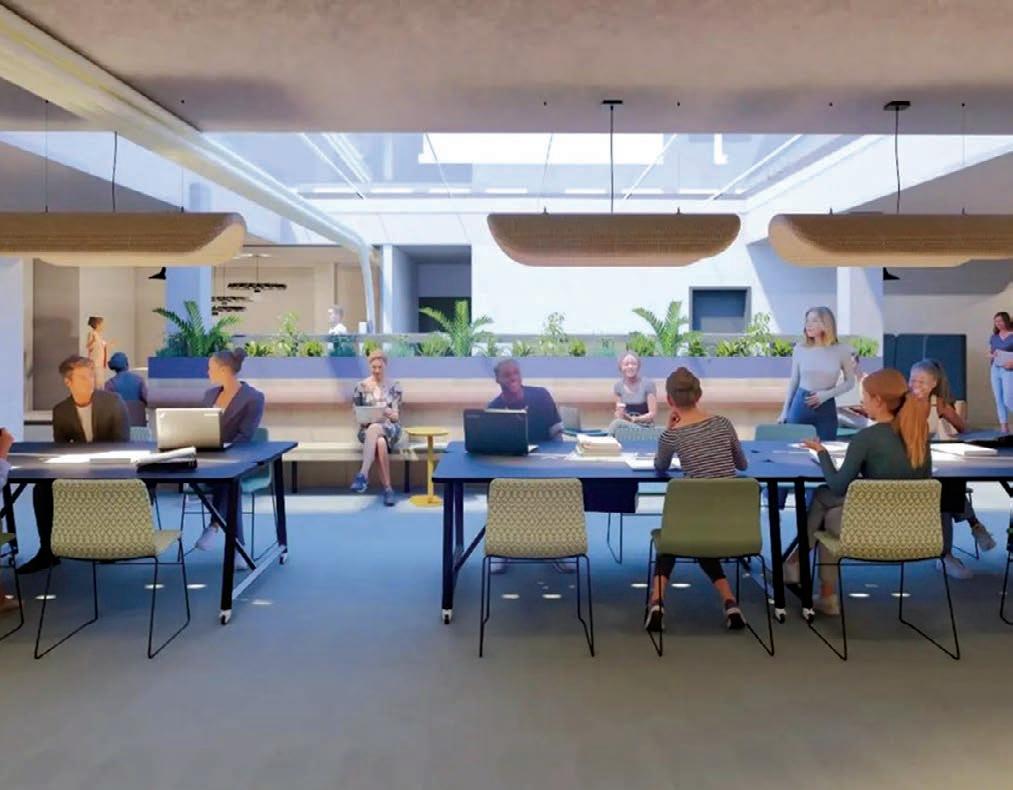

days on 17 July and 7 August, for businesses that might be interested in moving into the building, and is also hosting a launch party on 4 September.
Robyn Hutton, a business development manager at Langcroft, said: “We’re inviting businesses to come and see what this Cold War relict looks like now and discover what it could eventually become.

“Because the plans are in the early stages there is the potential for future tenants to design their own workspaces.
“At the moment it’s a blank canvas and the open days and launch event are aimed at anyone who is interested.”
To sign up for the open days scan the QR code above or visit: www.nottingham-war-rooms.com


high-performance Toyota GR Corolla at its Burnaston factory, near Derby.
The site already builds other Corolla models, and the new model – the GR is short for GAZOO Racing – will go into UK production in 2026. The business said choosing the UK factory reflected how much it recognised this country’s production capabilities, as well as the quality of its workers and supply chain – and the


Yoshihiro Nakata, president and chief executive of Toyota Motor Europe, said he was proud that Derby had been selected as the first overseas Toyota plant to produce GR vehicles for sale around the world. He said: “We really appreciate the historical support and recognition of the United Kingdom and would like to continue to contribute to UK society as a ‘Best In Town’ company.”


Management at East Midlands Chamber believe measures outlined in the Government’s Industrial Strategy provide a strong framework for growth – but must not overlook any sector, business or the region’s supply chains.
Investment in skills, speeding up of planning decisions, closer working relationships with the EU and increased support for SMEs are among initiatives revealed in the strategy – known as Invest 2035.
The plan followed a consultation process which included feedback from Chamber members. Key points of the strategy include:
• A ‘Business Growth Service’ to improve access to government support and funding
• Initiatives to address late payment from large suppliers
• Making securing government contracts easier
• Expansion of the ‘Made Smarter’ programme, with up to £99m from 2026 for SME manufacturers to take up new technology
• Free and fair trade promoted through strong international partnerships
• A ‘fast-track’ for some projects through the planning system
• £1.2bn extra investment for skills each year
• Support for adult learners through Local Skills Improvement Plans (LSIPs)
• More courses for 16–19-year-olds
• Funding to recruit FE teachers
• £39bn into advanced manufacturing
• £30bn into clean energy
• £31bn into creative industries
• £65bn into professional and business services
Chamber director of policy and insight Richard Blackmore (pictured, inset) said: “Measures announced in the Industrial Strategy are a welcome blueprint for businesses to build on and, depending on how implemented, could go some way to ease the challenges firms have been facing.
“Getting support so an SME can grow, reducing the reams of paperwork that have made trade complicated since exiting the EU, addressing the skills gap – these all seem progressive steps on paper.
“The detail of exactly how each element is applied is what will really matter and what needs to be scrutinised going forward.
“For SMEs, access to finance can make a big difference to growth, and a commitment to address late payment from suppliers is




something firms have been calling for, but we need to see how this plays out in practice.
“When it comes to exporting goods, reducing the paperwork that has made trade so costly and time-consuming since exiting the EU is another area that would be a huge relief to exporters, if the measures announced work.
“This needs to be pragmatic and a streamlined process that’s quick and straightforward. Enhancements to the planning system are always welcome, with our members having reported slow decision-making as a barrier to growth. However, this needs to be a comprehensive root and branch review, not simply a tinkering at the edges.
“The planning reforms the government has highlighted don’t address the paucity of planning resources – one of the biggest barriers for local authority planning teams that really slows things down. Prioritisation of skills in the strategy is encouraging when employers have been struggling to
Nottingham Trent University (NTU) has announced that Professor Dave Petley will become its vice-chancellor and president at the end of the year.
Prof Petley – who has a background in natural and environmental management – is currently vice-chancellor of the University of Hull and chair of Yorkshire Universities. He has also held senior leadership roles at the University of Sheffield, University of East Anglia and Durham.
During his tenure, University of Hull received TEF (Teaching Excellence Framework) Gold, reached a top 20 National Student Survey position, and achieved its highest ever research income.
He said he was relishing his new role in Nottingham. He said: “The university is an extraordinary success story with a powerful
fill vacancies – as six-out-of-10 East Midlands businesses reported in our latest Quarterly Economic Survey – but while £1.2bn of skills investment sounds like a solution, the breakdown of that spend needs to be seen.
“Eligibility will play a role in how businesses benefit from any supportive policies – cutting energy costs might be great news for a large business that’s granted the saving, but those that don’t will still face high costs, so that wouldn’t be a level playing field.
“With all the investment pledged, we need to see the region fully benefit. Behind every number, we need detail – for example, will supply chains in the East Midlands be drawn on, with any development? With skills investment, how exactly will the promised £1.2bn be broken down? What’s needed now is the critical detail on implementation of the strategy, which must have East Midlands businesses front and centre to enable growth.”
reputation, strong financial position and an excellent student experience.
“I am excited to meet the team, to meet my civic partners and to start to learn about how I can support and lead NTU through its next chapter.”
Caroline Wayman, who chairs NTU’s board of governors, said: “We are delighted that Prof Petley will be taking on the mantle of vicechancellor and president in December.
“Prof Petley brings a real breadth of experience and a genuine commitment to improving student outcomes, regional and civic place-shaping and enhancing our success in research and innovation.
“The vision Prof Petley put forward for NTU’s future was both compelling and exciting, we are very much looking forward to welcoming him to the team.”




Leicestershire businesses

NTU Mansfield hosted the EMMN Nottinghamshire June meeting, with engineering academics from the university giving a presentation on automation and robotics.
Principal lecturer Patrick Barber said: “The NTU Mansfield engineering team was delighted to welcome the EMMN to their lab and workshop to demonstrate possible robotic and automation solutions and training opportunities to local manufacturing business.
“EMMN members had the opportunity to interact with the equipment and to discuss possibilities with NTU teaching staff.”
Attendee Louise Freebury, owner and director of Charlie and Jane Ltd, said: “It was fascinating and a real privilege to be taken to see the robotics lab at NTU, and to speak to the team of engineers who developed the facility.
“We are a small Nottinghamshire-based laser engraving and cutting firm and have been thinking of expanding our offer to 3D printing and have decided to take this forward as a result of the visit.”
Nottingham, 9 July
A visit to the NTU engineering building on the Clifton Campus Derbyshire, 18 July
A team-up with Business Peak District at The Devonshire Dome, Buxton. Nottinghamshire, 29 July
Away day at ITP Aero, Hucknall Leicester and Leicestershire, 9 September Loughborough University Derby, 16 September University of Derby
Sanjay Foods and Sanjib 8 have joined forces to support the Healing Little Hearts Foundation, a UK-based charity dedicated to providing free heart surgery to babies and children in developing countries.
The two businesses are helping organise the Healing Little Hearts Charity Ball at Athena in Leicester on Friday, November 7, which will bring together more than 400 people including business leaders, entrepreneurs and representatives of charitable organisations to help raise vital funds.
‘I’m so happy to be supporting a charity that is making a real difference’
Over the years, Healing Little Hearts has performed more than 8,000 life-saving heart operations in 23 countries, changing countless lives and communities in regions where access to medical expertise and advanced healthcare is limited.
Sanjib Sahota and Atul Lakhani at the 2025 Chamber culture and communities event


Sanjib Sahota, managing director of events and marketing company Sanjib 8, said: “The event is going to be fantastic and I’m so happy to be supporting a charity that is making a real difference to so many people globally.”
Atul Lakhani, chief executive of Sanjay Foods, said: “This year will
mark 15 years since the charity was founded. The event will be a celebration, and we aim to raise as much money as possible so that the charity can continue to save the lives of thousands of children.”
For information contact Sanjib Sahota at email info@sanjib8.com



Leicester, Leicestershire and Rutland homelessness charity The Bridge (East Midlands) turns 30 this year –and its services are as vital now as ever.
Since it was founded, The Bridge has been on the frontline of the housing crisis, evolving from a small, local response to homelessness at Christmas into a deeply rooted, community-led organisation helping thousands of people navigate complex housing challenges.
It supports people facing eviction, fleeing domestic abuse, leaving care, grappling with mental health challenges, or who simply cannot make ends meet.
To mark the anniversary the charity is calling on more people to come forward and support its work.
A spokesman for the team said: “Today, our ultimate mission is the same – but the terrain is more complex. The housing crisis no longer affects just the visibly homeless – it touches young workers priced out of rentals, families forced into temporary accommodation,
older people slowly sinking into a rising debt of bills.
“The ‘hidden’ homeless are increasingly revealed, and in 2023 it was reported that homelessness in the East Midlands had risen by a whopping 33%. New challenges and demands surface, consequently, but what has remained constant is our belief: everyone deserves a safe, stable place to live. No exceptions. No excuses.
“We’ve survived and thrived for three decades because of the people around us. The volunteers who give their time, the businesses who lend their support, the donors who believe in our mission, and the public sector partners who share our vision.
“Community support isn’t just about keeping the lights on. It’s about being seen, heard, and sustained by those who believe that nobody should face housing crisis alone.”




EMA Training managing director Tracey Mosley (pictured) considers recent Government changes to Level 7 apprenticeship funding.
The Department for Education (DfE) has announced a major change to the funding rules for Level 7 apprenticeships –which are equivalent to a master’s degree – which will take effect from January 2026.
While apprenticeship providers across the country have been preparing for changes to Level 7 apprenticeships, this particular amendment – and more importantly, the timeframe in which the change will be happening – has been rather unexpected for all, so employers are encouraged to take speedy action to take advantage of the current funding before January.
So, what exactly is changing? Currently, learners of any age can begin a fully government-funded Level 7 apprenticeship.
However, under the new guidelines, from 1 January 2026, only learners aged 21 and under at the start of their apprenticeship or
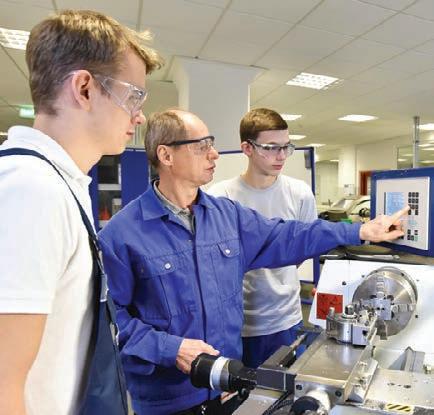
Only apprentices aged 21 or under will be eligible for funding
under-25 for care leavers and those with an Education, Health and Care Plan (EHCP) at the start of their apprenticeship in England will be eligible for funding at this level.
This means that:
• Learners aged 22 and over or not on an EHCP, will no longer be eligible for apprenticeship

funding for Level 7 programmes from this date.
• Learners who start their apprenticeship before 1 January 2026 will remain fully-funded regardless of age.
These changes are part of a broader government effort to rebalance apprenticeship funding and redirect support specifically towards young people and school leavers.
To ensure eligible learners can begin a Level 7 apprenticeship before the new rules take effect, we would suggest that businesses work with their preferred apprenticeship provider partner as soon as possible to ensure enough time for applications to be processed and apprentices to be onboarded before the 1 January 2026 cut-off.
Any learner currently enrolled on a Level 7 apprenticeship, or who

begins their apprenticeship before 1 January 2026, will continue to receive full funding until the end of their programme – no changes will be made to existing agreements.
EMA Training is committed to supporting employers in navigating recent and ongoing government changes to apprenticeship funding across the East Midlands. We remain highly focused on providing clear guidance and continued support for both learners and employers.


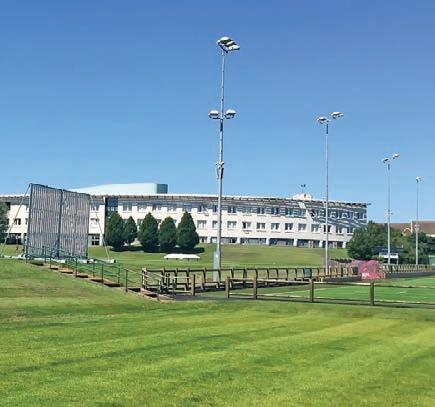
Sports facilities at Loughborough University
Loughborough University was named educational institute of the year at the FEVO Sports Industry Awards 2025.
The university was up against institutions including Manchester Metropolitan University Institute of Sport, Cardiff Met University Sport, and University Academy 92.
Pro-vice-chancellor for sport Professor Jo Maher said: “This award win is testament to the incredible work, drive, expertise, and dedication of our entire team.
“To be recognised at this level is extremely humbling. We’re proud to collectively continue to deliver world-class standards across the board, creating environments that are truly lifechanging and push boundaries.
“We’d like to extend a huge congratulations to all our academics, athletes, coaches, support staff, partners and leadership team who have contributed to this award.”
Three Leicestershire venues have been recognised for “excellence in tourism” at the 2025 VisitEngland Awards, which were held in Brighton.
Scooping silver and ranked as the second-best attractions in the country were The National Space Centre (large visitor attraction category) and the King Richard III Visitor Centre (small attraction category), while The Griffin Inn of Swithland, owned by cricketers Stuart Broad and Harry Gurney, took bronze in the pub of the year section.
Each was put forward after winning in the Leicestershire Tourism & Hospitality Awards, run by Leicestershire Promotions.
‘This is testament to a huge amount of hard work from everybody who works at the National Space Centre’
The King Richard III Visitor Centre, which opened in 2014, tells the story of the life, death and rediscovery of the last Plantagenet king, whose remains were discovered under a car park on the site.
Visitor centre general manager Phil Hackett said: “Thank you to everyone who has supported us over the last decade, including our incredible volunteers and every visitor who’s helped us celebrate the most incredible archaeological detective story ever told.”
Chas Bishop, chief executive of the National Space Centre, said: “This is testament to a huge amount of hard work from everybody who works at the National Space Centre and brilliantly enthusiastic visitors, and there is some amazing new exhibition content to come as the year progresses.”
According to place marketing body Visit Leicester the city’s tourism industry contributed almost £2.4 bn to the economy in 2023.

De Montfort students attended a business Insights Day at the Chamber’s Friar’s Mill managed workspace in Leicester.
The day was offered as part of a prize to students on the university’s black and ethnic minority Lead and Inspire leadership programme. Students were challenged to progress development of an AIpowered PDF scanner and then present their results on scaling up the project.
The winning team was revealed at a Lead and Inspire awards night and in addition to taking part in the Chamber’s Insights Day, they will also get a trip to Amsterdam as part of the prize.
De Montfort University career development manager Humera Hodgkinson said: “There’s an employment gap between students from BAME – black or ethnic minority backgrounds – to their white counterparts.


“We’re trying to close that gap with the leadership programme. Part of that involves external companies setting life projects for the students.”
Chamber data analytics manager Harsh Shah planned and led the business Insights Day and set the AI project for the students to work on.
Humera said: “The students had to be like consultants, having to solve a problem set by Harsh Shah –and they provided that solution. Harsh has done a fantastic job of demonstrating how businesses work and how they deal with clients.
“The students said the day gave them a different level of motivation
and determination to do something with the skills they have. We had really good engagement for this programme and it was the first time we ran it for students across all the faculties so we’re hoping it grows, giving more students exposure to businesses.”
DMU computer science graduate Kishan Mansukhlal, who took part, said: “The programme has been so beneficial for me and made me more confident, more able to present ideas. One skill I’ve learnt is how to present technical information to a non-technical audience.”
Harsh said: “As a DMU graduate in business intelligence systems and data mining, I know first-hand how the university is good at equipping students with the knowledge and skills needed by employers. The Chamber’s business Insights Day was aimed at helping students applying their knowledge and skills into real world business projects.”


Dozens of affordable homes are to be built on disused land in Kirkby in Ashfield.
Ashfield District Council wants to buy a 19-acre site off Southwell Lane, between the railway line and Low Moor Road.
The deal, which depends on winning planning approval first, would see around 70 new homes built. The land would be paid for using money from housing developers and the council hopes to secure millions of pounds in funding from Homes England to help pay for the estimated £16m development – to be paid back from rental income over 40 years.
The brownfield site was originally railway sidings and all the buildings have been demolished.
Cllr Tom Hollis, executive lead member for strategic housing and climate change, said: “These are exciting plans which again illustrate our ongoing commitment to continue building more affordable homes for people across Ashfield. This new development will be our largest to date and see disused land brought back into use for housing, in the heart of Kirkby.”
The team at a Derbyshire firm that designs and sells indoor and outdoor play and nursery equipment has hit its £80,000 target in aid of Derby Kids’ Camp and Derbyshire Children’s Holiday Centre.
Cosy Direct raised the money through its SkegVegas100 100mile cycle ride and a 20-mile Amble to Ashbourne hike, with some 200 participants getting involved.
More than 50% of the total was raised by headline sponsor Jola with support from 30 other companies, 1,000 donors, 70 volunteers and 40 members of staff who donated 1,000 hours of help running up to the events.
A spokeswoman for the business said: “All-in-all, a great second year, the flood of human stories are of course what it’s all about – there was a superb spirit across all channels and lots of personal bests.”
The JustGiving page is still up and running at is.gd/bXVILF

The chief midwifery officer for NHS England visited the University of Derby to meet with students, academics and healthcare partners to see how the university is nurturing talent to strengthen the country’s maternity services.
Kate Brintworth, who leads the national strategy for midwifery and maternity care in England, was joined by practice partners of the university, with representatives from University Hospitals Derby and Burton NHS Trust, Nottingham University Hospitals NHS Trust and Sherwood Forest Hospitals NHS Foundation Trust.
‘A valuable opportunity for our staff and students to engage with senior healthcare professionals’
During the visit, discussions focused on the challenges facing the profession and the importance of strong links between education providers and the NHS in supporting the future of healthcare and ensuring high standards of care for women and families across the country.
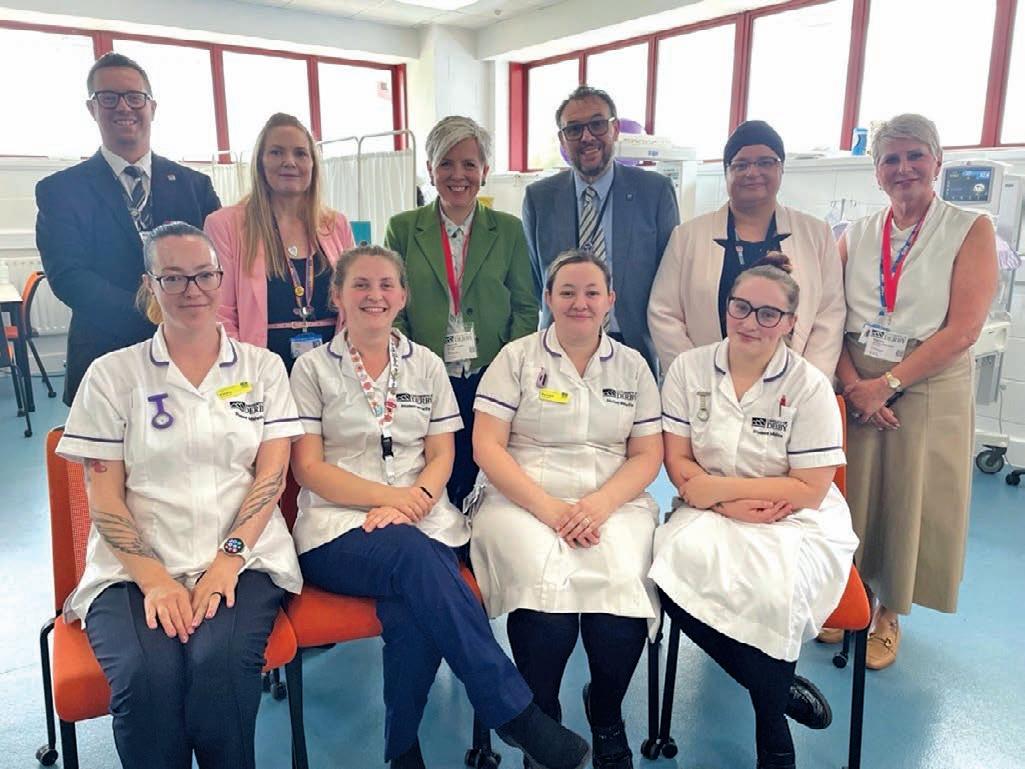
Navjot Virk, head of discipline of midwifery and children’s nursing at the university, said: “The visit was a valuable opportunity for our staff and students to engage with senior healthcare professionals and demonstrate the amazing facilities and opportunities we offer at Derby.
“We are incredibly proud of the experience we provide for our students. Through collaborations with our practice partners, we
combine knowledge, skills and realworld experience to ensure graduates leave us confident and well-prepared to enter the profession right away.”
Kate Brintworth said: “Listening to our students is crucial if we are to provide them with the support and learning to help them to grow in confidence, and develop their skills, enabling them to flourish in our profession.”



highlighting the importance of environmental sustainability through creativity takes place at Derby Cathedral this summer.
Called Brick by Brick – Building a Solid Foundation, the exhibition features a one-off model of Derby Cathedral and the surrounding city centre, crafted from LEGO by artist Brick This.
There are also interactive activities, talks and workshops aimed at families, schools and
build solar-powered LEGO vehicles and buildings.
It runs from Friday, 25 July to Thursday, 21 August during Cathedral hours – usually 9-5pm. Entry is free with a suggested donation of £3, although there might be a charge for some events.
The festival is expected to attract thousands of visitors, following the success of previous installations such as Peace Doves, Gaia and the Museum of the Moon.
In May, 20 new members joined East Midlands Chamber:
• Ando Recycling
• Anicca Digital
• BBCC
• Boyes Design
• British Army ‘Polar Bears’ Engagement Team
• British Gas Academy
• Culture Derby
• H2OiQ
• Happy Pet Products
• Kadant PAAL
• LaunchpaddAI
• Laura Serrant
• Mint Technology East
• Omega Home Improvements
• OUTPOSTX
• Premier Chauffeurs Nottingham
• Red Umbrella Bespoke Mental Healthcare
• StirLight
• Trent Conference Centre
• Truly SMB







Nottingham Greyhound Stadium has welcomed two new members to its team – Sarah Newman as marketing and communications manager and Jozef Blachnio as duty manager.
The pair have been brought in to bring fresh ideas to the business, increase footfall and ensure the stadium continues to be a popular visitor attraction.
Sarah will oversee getting the word out about all that’s happening at the stadium, while Jozef will run the show behind the scenes, ensuring everything goes smoothly. He will also work with Sarah to come up with new ideas to make the experience even better for everyone who visits.


The long-standing chief executive of Framework – the charity and housing association which helps tackles homelessness across the East Midlands and Sheffield – is stepping down after 29 years.
Andrew Redfern has led the charity and one of its predecessors, Nottingham Help the Homeless Association (NHHA), since 1996. A successor is now being sought prior to his plan to retire in December.
In the late 1990s, as director of NHHA, Andrew was an architect of the merger with Nottingham-charity Macedon, which resulted in the creation of Framework in 2001. He became its chief executive the following year, and since then the quality, range and scale of the services offered have increased significantly.
Today, more than 18,000 people approach Framework for help each year in Derbyshire, Lincolnshire and Nottinghamshire as well as Sheffield and Scunthorpe, and it houses more than 1,400 people at any one time – most of them in self-contained units.



Will Wells has been appointed chief executive of Space Park Leicester, the pioneering £100m University of Leicester-led science and innovation park.
Will has been appointed to put a stronger focus on the site’s commercial strategy, moving from the role of director of commercialisation and knowledge exchange within the university’s Research and Enterprise Division.
He led on the commercial and government engagement themes of Space Park Leicester’s development from the initial concept through to its delivery.
His career has seen him working at the juncture of business, universities and government, with senior roles in global corporations Anglo-American and Cummins, the civil service and high growth SMEs.
He has been the architect and executive lead on major national innovation programmes, including the Space Research Innovation Network & Technology (SPRINT), VentureVersity and Forging Beyond.
He is director of the European Space Agency Business Incubation Centre Leicester and is a fellow of the Chartered Management Institute.
He replaces Professor Richard Ambrosi at Space Park Leicester, who moves on from the role of executive director to focus on the spinout company Perpetual Atomics, while remaining as professor of space instrumentation and space nuclear power systems at Leicester.
Will said: “I am absolutely delighted to be leading Space Park Leicester in this next phase of its development and working with colleagues to deliver on our vision for a world leading beacon of Research, Knowledge Exchange and Innovation for the whole institution.
“I am passionate about research and building partnerships that deliver impactful and inclusive growth for the university and our region. Beyond this, Space Park can lay claim to global reach and reputation, aligned with our international prominence in space and earth observation.”

Shabir Ismail (pictured) has been announced as the new principal and chief executive of Leicester College, following the planned departure of Verity Hancock this summer.
Shabir brings many years of experience to the role and has demonstrated his dedication to the college and more widely to Leicester during his tenure as acting principal.
He will officially take up the post on 19 August.
Shabir said: “I am truly honoured and humbled to be appointed as principal and CEO of the college. I want to thank the board and the entire college community for their trust and support.
“As acting principal, I’ve had the privilege of working alongside an incredibly dedicated and talented team.
“I look forward to continuing this journey, building on our shared successes, and striving together to make an even greater impact for our students, staff and the wider Leicester community.”

Hardy Signs has expanded its team, welcoming new talent in both the marketing and fabrication departments.
Joining the marketing team are Chloe Waring and Lara Holland, both bringing fresh energy and new perspectives to the digital and business strategies.
Chloe is currently studying her Level 3 multichannel marketing apprenticeship at EMA Training, while Lara is gaining hands-on experience alongside her T-Level in business at Burton and South Derbyshire College. Their studies will complement real-world industry experience, allowing them to develop skills that directly contribute to Hardy Signs’ growth.
Meanwhile, experienced welder Tommy James joins the fabrication department.
Managing director Nik Hardy said: “At Hardy Signs, we are committed to investing in talent and expanding our in-house capabilities.
“Welcoming Chloe, Lara and Tommy to the team reflects our dedication to both professional development and delivering outstanding signage solutions. We look forward to seeing their contributions help drive the business forward.”
Dronfield Heritage Trust, the organisation which runs Dronfield Hall Barn on the town’s High Street, has a new chair of trustees.
Louise Third MBE (pictured) has been a trustee of the charity for two years and takes over from Alan Powell, a former newspaper editor who has been very active in Dronfield civic life.
She steps in as the trust celebrates the 10th anniversary of the restoration of the Grade II* listed building and the development of its stunning gardens. With the support of a further grant from the National Lottery Heritage Fund, the charity is now planning ahead for the next 10 years.
She said: “It is a real privilege to have been asked to serve the Dronfield Heritage Trust and everyone associated with the charity in this very practical way.

“I recall the day well in 2004 when I hesitantly ventured up a long ladder to explore the vast oak beams of the derelict Old Hall Barn on High Street.
“One of the trustees had asked me to do some voluntary press work for them. It was a newsworthy story, so I said yes.
“Never did I imagine that 21 years later, and 10 years since the £1.5m restoration was completed, I would be taking over as chair to continue the work and help shape the charity for the next 10 years.”
Louise and the board of trustees have already started work on a review of how the organisation runs and what more can be achieved.
With around 60 volunteers, more than 1,200 “Friends of the Barn”, and a hardworking staff team, the charity is well-placed to build on its community and commercial success.
She said: “We’d really like to develop our connections, especially with potential donors and corporate partners. We are custodians of a unique venue which attracts well over 50,000 visitors a year.”
Following six years of study, IMA director Joe Travers has graduated from the RIBA Studio course run via Oxford Brookes School of Architecture, and qualified as an ARB & RIBA architect.
Joe has graduated with a Royal Institute of British Architects’ (RIBA) Diploma in Architecture, while simultaneously completing RIBA’s own Part 3 qualification – the advanced diploma in professional practice in architecture.
Already a qualified chartered architectural technologist, Joe began the RIBA course in 2019 while an associate at IMA after exploring professional development options and being recommended the RIBA course by a company peer.
Over the last six years he has studied full time alongside his demanding day job through a distance learning course which combined online lectures, inperson exams and production of a portfolio of work, with guidance from a range of personal tutors and Oxford Brookes University examiners.
He is now registered as a fully qualified architect with the Architect’s Registration Board (ARB) in the UK and as a chartered architect with the RIBA.
Loughborough Schools
Foundation director of sport Jo Hackett has been appointed as a founding member of the England Rugby Schools (ERS) Board – a new initiative by the Rugby Football Union (RFU) aimed at promoting school rugby across the country.
The national board follows a review of rugby in schools, which identified the need for a more modern, responsive and inclusive governance model.
Jo said: “I am delighted to have been asked to join the redeveloped RFU Schools Board and am looking forward to meeting the other board members – working alongside them to support the development of the school rugby programme nationally and, in some small part, to be involved in growing and sustaining the sport.
“Having grown up in a family where rugby was part of everyday life, and now as a parent to an aspiring player, and with over 20 years’ experience in physical education, I hope to bring both passion and practical insight to this exciting role.”




This September, a new chapter begins for the University of Derby as it opens the doors to the Cavendish Building, which will become the new home of Derby Business School.
Dr Nicola Lynch (pictured), head of Derby Business School, writes about how this landmark development – in the heart of the city –combines world-class academic facilities with a commitment to social value, sustainability and community impact.


The seven-storey Cavendish Building is more than a state-ofthe-art academic facility; it is a symbol of the University of Derby’s values. The building itself will create a space where we can enhance our teaching, learning and research capacity, but also act as a driver of local prosperity, collaboration and social impact.
From the earliest stages of planning, we knew this project could, and should, deliver more than a space for learning.




Given its scale and central location, we recognised a unique responsibility to ensure the development itself generated meaningful outcomes for the Derby region.

That ambition shaped our partnership with Kier Construction, who shared the same vision of embedding community benefit into the project.
The impact of this approach is already clear, as the project has created 21 new full-time equivalent jobs and supported 20 apprentices who have completed 291 weeks of hands-on experience between them – laying the foundations for careers in the sector.
Kier’s team has also dedicated 162 hours of volunteering to local causes, including environmental work with Friends of Markeaton Park and support for a local RSPCA centre.
These efforts are not simply numbers on a page, they present new career pathways, support for community organisations and real investment in the region.
CSR in this context is not an addition in the project – it is a deliberate, essential component of our blueprint for the business school of the future.
As a Civic University, we take seriously our responsibility and commitment to deliver economic, social, cultural, educational and environmental prosperity to the region.
Each year, we are proud to contribute around £300m to the East Midlands economy through jobs, contracts, research and education.
Derby Business School plays a central role in that ecosystem. We create opportunities for knowledge exchange, innovation, and skills development that respond to the needs of our region’s businesses – from global employers to ambitious SMEs and voluntary organisations.
The Cavendish Building has been designed with this mission in mind. With SMEs and start-
Dr Rhiannon Jones (pictured), the University of Derby’s associate professor (civic practice) and head of civic and communities, said its Civic Agreement – a pledge featuring signatories including Derbyshire County Council, Derby City Council, the Derbyshire Police and Crime Commissioner and East Midlands Chamber –was created to drive ambition and positive change.
The civic team plays an important role in creating opportunities for collaboration and its most successful projects include the Civic Curiosity E-bike initiative and S.H.E.D (Social Higher Education Depot) –a mobile research and innovation space launched in 2019 to engage lifelong learning, public engagement and teaching throughout creative industry and cultural practice.
Dr Jones said: “The University of Derby is proud to be the only university in the city and county and takes seriously the role it plays in ensuring the continued success and long-term prosperity of our “home” and the communities, organisations, businesses and people within it.


ups co-located within the building, we are bringing together students, academics, researchers and industry under one roof, creating a dynamic space for collaboration.

“The Civic Agreement is a collaborative agreement designed to deliver maximum impact and benefit, and to drive forward strategic growth and development ambitions to secure a prosperous, long-term economic future for our region.
“Research is at the heart of the University of Derby and we aim to use our expertise in areas such as creative industries, low carbon, data science and social policy, to make positive economic and social impact through collaboration, knowledge exchange and support with innovation.

“The Civic Curiosity E-Bikes are two large electric bikes, each one featuring a compact wooden cabinet that can be unfolded to reveal compartments containing curious artefacts.
“They are designed to spark curiosity and engage the community, particularly young people and those from marginalised groups, in art and research, and as well as showcasing research to the people of Derby and Derbyshire.”
which partnered with the University of Derby for the sold-out CivicLAB Conference 2025.
The civic team was also recently highly commended in the Shift Left Award of the Socitm Gala and Awards for leadership, public sector work and proactive approach to accessibility.
When consulting for the University of Derby’s new Cavendish Building, the civic team played an important role in ensuring that community values were considered throughout.
Dr Jones said: “A critical component of the Derby Business School is to create a community driven by expertise, creativity, curiosity and entrepreneurship.
“Connecting with unengaged communities with the purpose of opening doors and providing a platform for them so that they can be heard, supported and enabled to prosper is essential.
“The new Cavendish Building will be a place for networking and fostering ideas. We want it to be a place for the community, staff and students where collaboration is encouraged in a welcoming, accessible space.
“Universities have a unique role in helping their communities to thrive. We want the University of Derby to be an integral part of the community.

She said a partnership with Barnet Borough Council, for instance, was one of many successful relationships that the civic team had developed.
It works closely with Socitm – the Society for Innovation, Technology and Modernisation –
“As a Civic University, we have a responsibility to deliver economic, social, cultural, educational and environmental prosperity to the region, too, and the Cavendish Building presents an extraordinary opportunity to assure the region’s long-term sustainability.
“These are exciting times for not only the University of Derby, but its community, too.”




At the heart of Derby Business School is our commitment to ‘Better Business, Better Society, Better Future’.
We believe business should be a force for good, and our curriculum, partnerships and operations reflect that belief.
Sustainability is not treated as a standalone topic but woven into everything we do.
From interdisciplinary learning that encourages students to apply environmental thinking to real-world business decisions, to the sustainable design and operation of our facilities, we are preparing our students to become leaders of responsible change. At the University of Derby, we work closely with major employers
‘Our research is designed to create solutions – not just academic insight, but practical, applied knowledge that helps shape better business and a more sustainable world’
including Rolls-Royce, Toyota, the NHS and a broad base of SMEs, ensuring that our programmes are aligned to industry needs and are future focused.
Our research makes meaningful contributions to some of today’s most urgent challenges, including renewable energy, sustainable supply chains and environmental impact reduction.
But more than that, our research is designed to create solutions – not just academic insight, but practical, applied knowledge that helps shape better business and a more sustainable world.
As we prepare to open the Cavendish Building, we see it not as the completion of a project, but the start of something bigger.


It represents a blueprint for the business school of the future – one that is deeply connected to its community, built around responsible industry engagement, and driven by a clear sense of purpose.
We are proud of the impact already created through the development phase, but we are even more excited about what comes next.
This building will serve as a hub of opportunity for our students.
We look forward to welcoming our partners, collaborators and community into this next chapter, and to working together to shape a more inclusive, sustainable and prosperous future.

Stephen Pepper and Steve Jones both studied construction management at the University of Derby and graduated just three years apart in 2011 and 2014.
After landing various roles in the construction industry, they secured positions at Kier, construction provider and contractor of the Cavendish Building, which will open as the new home to the university’s business school later this year.

With their shared commitment to excellence in construction and a personal connection to the university, the duo are helping to build a space that will serve as a hub for the business community and shape the next generation of talent, with the skills to improve business, industry and society.
Having joined the project in October 2024 as project manager, Stephen Pepper has played a vital role in overseeing the operational running of the site during the construction phase.
He said: “It was certainly a proud moment when I was asked to be involved in the development.
“It only seems like yesterday I was a student at the University of Derby, and now delivering a project for them on this scale is a real honour.
“The Cavendish Building is a one-off build, which is bespoke in its design. It is amazing to see it all coming together and be involved in a building that will leave a lasting legacy for many years to come in my home city.”
Steve Jones began working on the Cavendish Building in September 2023 as a senior planner, playing a crucial role in monitoring and developing the construction programme.
‘It feels like I have given something back to the university, that helped me build the career that I have today’
He said: “It is a privilege to be involved with a key University of Derby project, especially such a landmark building. I live in Derby, so it is great to be engaged in something that I will see regularly and that my city will benefit from. I have enjoyed the uniqueness of the project and the modern methods of construction that I have not worked with previously. Most importantly, it feels like I have given something back to the university that helped me build the career that I have today.”
The Cavendish Building, located in the heart of Derby’s city centre, is set to offer inspirational teaching in a setting to match, and will help to establish the city as a destination of choice for students and academics. With small businesses and startups co-located within the building, the space is designed to be a place where
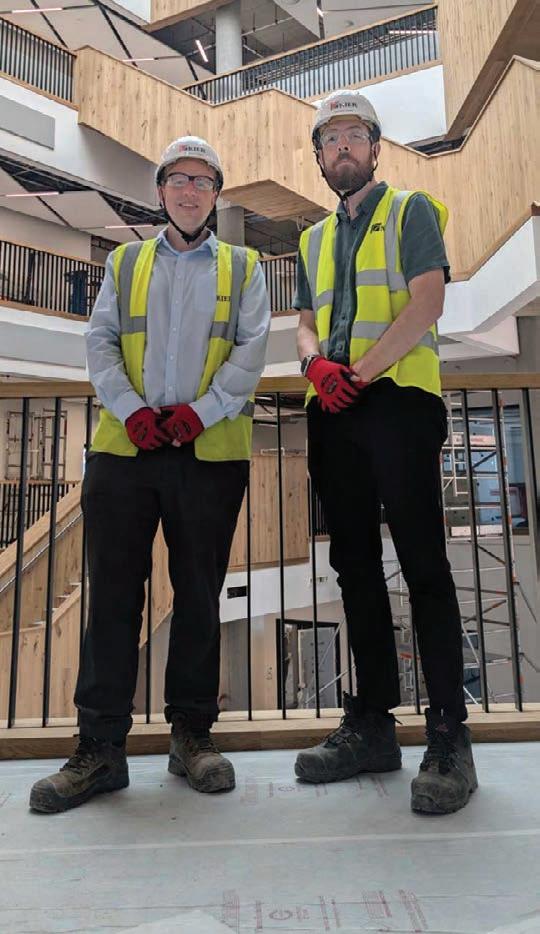


students, academics and industry can work in collaboration to support and nurture growth.
The state-of-the-art facilities include a finance lab complete with a real-life trading floor, a Google-style creativity lab and an XR suite to create an immersive learning experience.
Stephen described the Cavendish Building as having a “cutting-edge feel” and “wow factor”.
He said: “As the facility will collaborate with global businesses, they will get the benefit of a flagship modernised building, while students will gain from work placements, guest lecturers and mentors in the relevant fields – it really is a win-win for all.”
Dr Nicola Lynch, head of Derby Business School, said: “It is fantastic to see Derby alumni have such successful careers in the construction industry and, as part of that, are working on a project that is directly linked to the university.
“Stephen and Steve are playing a key part in shaping the future of the University of Derby, a place that initially shaped their career.
“Through our Cavendish Building, we are creating a blueprint for the business school of the future. Our close industry partnerships, first-class facilities and highquality academic research mean we are changing the way organisations and individuals do business.
“The new building will be a true testament to the success of our alumni network, helping to develop and inspire the next generation of talent. We look forward to seeing where their esteemed careers take them next.”


Mattioli Woods, the Leicesterheadquartered wealth and asset management business, is merging with wealth and investment specialist Kingswood.
The deal – subject to the FCA’s approval, expected later this year – is part of a shared ambition to “deepen client relationships, grow their talent base, and enhance their service and product offerings”.
The combined group will serve more than 25,000 clients with £25bn in assets under administration and advice, adding economies of scale across wealth planning, investment management, and client service.
Mattioli Woods chief executive Ian Mattioli MBE DL said: “Our stated long-term ambition is to become a national wealth management firm with £60bn in assets and up to 300 advisers.
“Combining with Kingswood is a transformational moment and sees us accelerate our journey to achieve these goals. This deal brings together two highly complementary businesses with a shared commitment to putting clients first and delivering long-term value.
“We’ve admired Kingswood’s growth and reputation for some time. Together, we are creating a stronger, more dynamic business that is wellpositioned for the future – for our clients and our people.”

Media has taken a stake in a company run by a wellknown professional artist, with plans to use its expertise to drive the business to even greater success.
Watercolour.tv is an online subscription service providing video lessons and live tutorials for beginners and those looking to improve their painting skills.
‘Subscribers will be able to ask questions and upload work’
It was launched by artist and bestselling author Matthew Palmer, who regularly appears on TV and has tens of thousands of social media followers – and has more than 4,000 paying clients logging on for step-by-step watercolour tuition.
Matthew believed the business needed additional expertise and turned to Purpose Media, who, for a number of years, had provided him with marketing advice and support.
A new Dragons’ Den-style partnership – similar to the BBC TV show in which entrepreneurs seek backing from a panel of business experts – has seen South
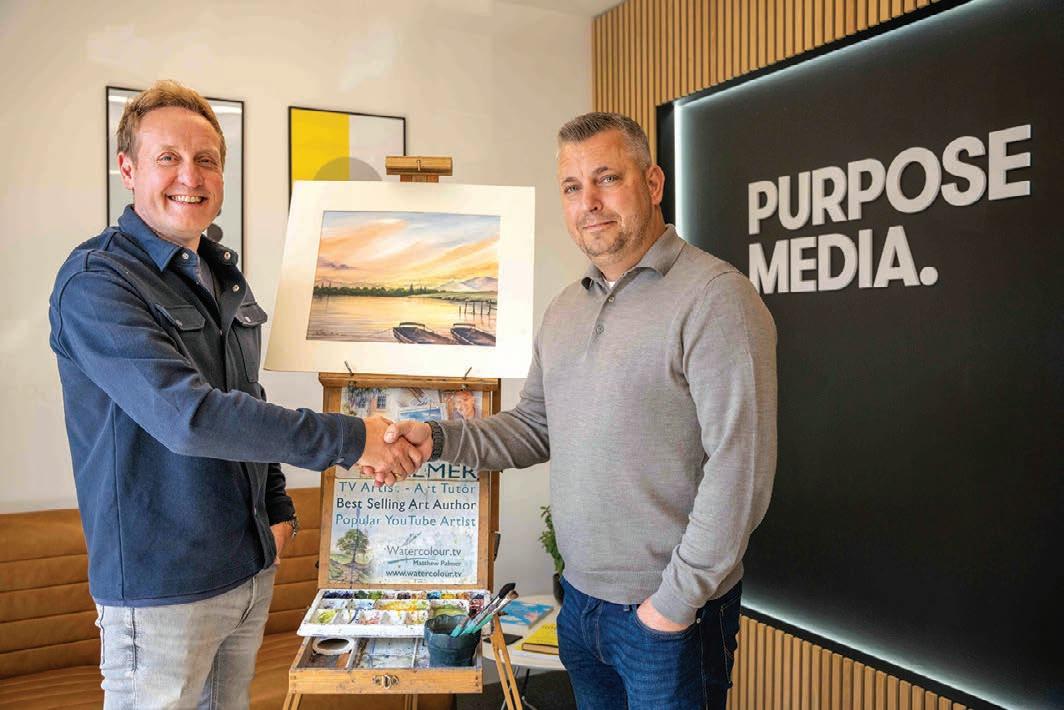
Normanton-based Purpose acquire shares in Watercolour.tv. The agency’s managing director Matt Wheatcroft and digital innovation and strategy director Tim Lenton have also provided financial, business and strategic insight to help further develop the brand.
The agency’s digital experts will create a new website which will better showcase Matthew’s services, together with apps for both IOS and Android with functions including using phone cameras to allow users to capture

images that can be turned into templates for paintings. There will also be the ability for subscribers to share galleries of their completed work.
Matthew, who has sold more than 400,000 books worldwide and fronted TV shows such as A Splash of Paint, said: “Subscribers will be able to ask questions and upload work that they are particularly proud of to share with others.
“I can’t wait to see what they are inspired to create.”
Hugh Sutherland

The team at Midlands-based managed service provider Document Network Services (DNS) is emphasising the critical role of human error in cyber security breaches – highlighting how employees can inadvertently become the weakest link in an organisation’s security chain.
They have drawn up an article drawing attention to common pitfalls such as email phishing scams, weak passwords and the use of unsecured personal devices, with insights from recent phishing simulations where employees clicked on suspicious links and even submitted login credentials.
Sales director Hugh Sutherland said the incidents highlighted the importance of ongoing employee education and awareness training.
He said: “Our experience shows that even well-meaning employees can make mistakes that compromise security.
“By implementing targeted training and robust security protocols, businesses can transform their workforce from a potential vulnerability into a strong line of defence.”
The full article is available on the DNS website.

The University of Leicester has joined a new network to examine and assess the value of nuclear weapons and inform UK nuclear policy.


De Montfort University is developing a game based on research into promoting trust between young people and adults – and is looking for business support.
Senior lecturer Rachel Rouncefield is engaged in work strengthening links between young people and the adults that work with them to give them confidence, empower them and encourage them to play a bigger part in their community.
Rachel, who works in the School of Applied Social Sciences, said young people told the researchers that working with adults in an equal relationship to meet an agreed objective increased their confidence and communication skills, their feelings of worth and their sense of making a difference.
She said the knowledge gained has since been shared with a business innovation expert from Denmark called Morten Toft.
A conversation with Chamber chief executive Scott
Knowles got them thinking about the challenges for communities and businesses in the East Midlands and whether there was a way to apply the findings.
The result is the “Changemaker Game”, an interactive, scenario-based game where players take on the role of changemakers and solve challenges rooted in real-life situations.
A standard edition set in a fictional city includes realistic dilemmas inspired by challenges young people and communities face, while a custom edition is set in the player’s home city or town.
Morten and Rachel are looking for Chamber members and other businesses from Leicester and Leicestershire to join round table discussions about the idea on 14 July and 1 September.
To find out more email rachel.rouncefield@dmu.ac.uk or visit mortentoft.com/ changemaker-concept
The UK Nuclear Deterrence Network is a joint venture between Leicester, King’s College London and the Royal United Services Institute (RUSI).
The RUSI is the world’s oldest and the UK’s leading defence and security think tank with a mission to inform, influence and enhance public debate to help build a safer and more stable world.
The network aims to analyse and expand the landscape of ideas and advance thinking surrounding UK nuclear deterrence considering different perspectives and developing new approaches to it.
It comes at a time of growing global instability with conflicts in Ukraine, Israel and the Middle East and continuing tensions between India and Pakistan.
The network is supported by the Nuclear Deterrence Fund (NDF), a Ministry of Defence pilot programme to stimulate wider UK expertise in nuclear deterrence and support policymaking.
Derby College Group (DCG) is growing its partnership with organisations providing substance misuse support for students across the city.
The college is working in collaboration with Grow, Change, Live, 1625Outreach, and Compass, to provide wellbeing support for students who might feel they have nowhere else to turn.
Since 1625Outreach arrived in Derby in 2022, DCG has been a key partner in supporting young people and young adults with specialist
advice and intervention services.
The relationship was strengthened in 2024 when the college agreed to host a new project, funded by Derby City Council, with a full-time outreach worker.
Jade Watts, targeted intervention coordinator for 1625Outreach, now works directly with students across DCG sites, offering one-to-one support and harm reduction advice.
She also runs drop-in sessions addressing drugs, alcohol, and associated risks.

Mervin Williams and Jade Watts of 1625Outreach



East Midlands Chamber has secured more than £2m in government contracts to boost business growth. The successful procurement of the contracts for the coming year puts it in an even stronger position to help businesses of all sizes realise their growth ambitions.
The Chamber has been selected by East Midlands Combined County Authority (EMCCA) as delivery partner for the workshops programme together with its High Growth and Export programmes.
The extended UKSPF-funded Accelerator programme will also run for a further year in Derby, Derbyshire, Nottingham and Nottinghamshire, with programmes in Leicester and Nottingham focused on digital and green technologies.
The investment of additional Chamber finances in these initiatives will help leverage even greater results for its members.
The Chamber’s expert team of business advisers and trainers typically support some 12,000 businesses every year with one-toone business support, introductory webinars, in-depth action planning workshops and access to finance.
This latest injection of funding will help boost skills and knowledge within businesses, helping them adapt to changing market conditions and client needs, and keep pace with a rapidly changing and often fragmented business support landscape.
THE UKSPF-FUNDED ACCELERATOR PROGRAMME
Funded by UK Government through the UK Shared Prosperity Fund, the Accelerator project will continue in Derby, Derbyshire and Leicester, with Nottingham and Erewash businesses also now eligible for
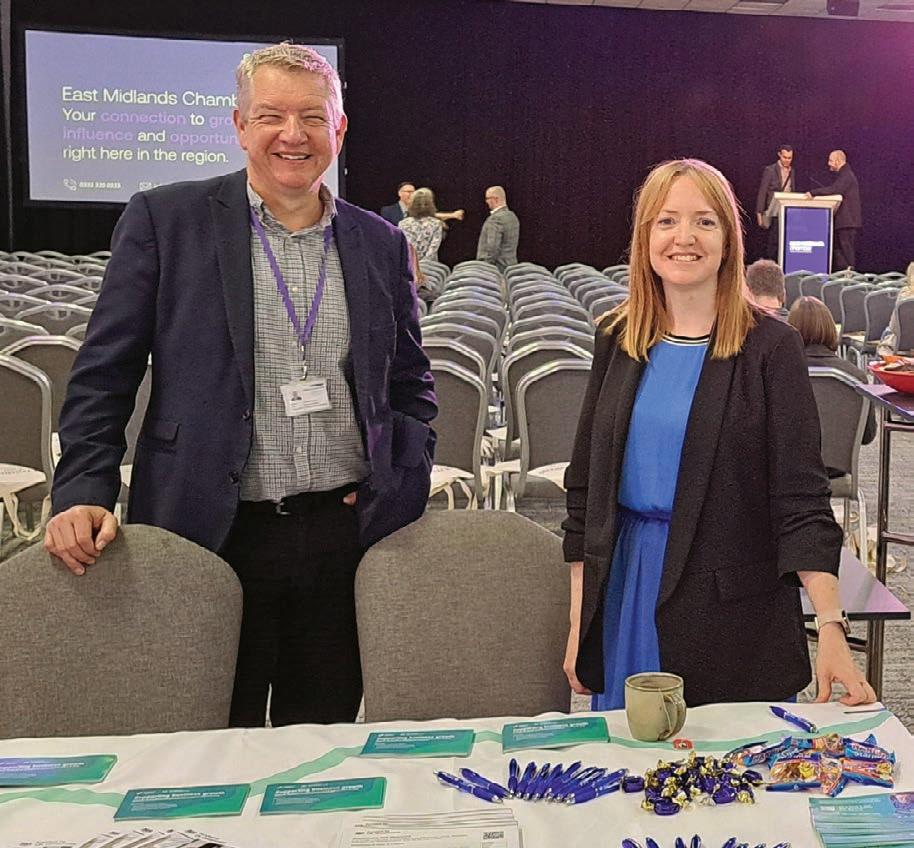

business support. The project will focus on those businesses able to demonstrate increased productivity and the adoption of new to the firm technologies and processes.
Growth support and grants are available to support rapidly growing and ambitious businesses in Derby, Derbyshire, Nottingham and Nottinghamshire to innovate and launch a new product or service to market.
Businesses must be able to show annual growth of at least 20% in revenue, employment or market share over three consecutive years.
Eligible businesses can apply for up to £2,000 of fully subsidised Chamber training. For earlier stage high-growth businesses or junior leaders of larger organisations this might be in areas such as sales, leadership, culture, strategy, access to new markets, finance and emerging leaders.
For more established scale-ups, typically employing more than 25 employees, topics might include strategic leadership, governance, performance management and sector positioning.
In addition, they can apply for £8,000 of funding towards costs such as consultancy and training, ‘talent’ salary costs, equipment of up to £5,000 per item, and graduate student placements, with the first £2,000 fully subsidised and the remaining £6,000 at an 80% intervention rate.
Areas that qualify for High Growth consultancy and training include market research and expansion, product development, process improvement and technology integration, regulatory,

compliance and legal services, sales & marketing, financial or risk management, sustainable growth, R&D and IP management, and future planning and exit strategies.
Innovation vouchers of up to £5,000 are also on offer to tap into technically focused support led by Nottingham Trent University, the University of Derby and the University of Nottingham in precision manufacturing, virtual and immersive production, sustainable chemistry, sustainable product and packaging design, and medical technologies innovation.
The Chamber continues to be the delivery partner for the Government’s Innovate UK programme and, where suitable, will refer High Growth Accelerator participants to Innovate UK’s team of growth specialists who support high potential innovation driven companies to explore business innovation, source finance and open new international markets and achieve scale.
‘This latest injection of funding will help boost skills and knowledge within businesses’

Specialist support and grants are on offer to businesses in Derby, Derbyshire, Nottingham and Nottinghamshire seeking to research or launch a product or service to a new domestic or overseas market. This includes support on export readiness audits and planning, workshops and webinars, and SWOT analyses.
Businesses will be supported whose export ambitions: create new jobs; improve productivity; or can show engagement in new markets. The latter can be demonstrated by launching a new product or service in a new region or country, by undertaking research, or by attending a conference, workshop or training course to launch a new product.
Eligible businesses can apply for up to £2,000 of fully subsidised Chamber export training. In addition, they can apply for £8,000 of funding towards costs such as consultancy, salary costs and equipment, with the first £2,000 fully subsidised and the remaining £6,000 at an 80% intervention rate.
The new East Midlands International Trade Network will provide members with the opportunity to participate in chaired
forums, access support, hear from industry experts, share expertise, challenges and opportunities with peers, and influence the development and delivery of the programme. Both the High Growth and Export Accelerators will have a particular focus on manufacturing & engineering, green energy & technology, and creative & digital industries.
In addition, the Chamber will continue to deliver Growth Hub services in Derby, Derbyshire, Nottingham and Nottinghamshire under the new name of EMCCA Growth Hub. At the heart of the Growth Hub is its valuable triage service which offers information, advice and support to businesses of all sizes. Since its inception in 2014 when it was known as D2N2 Growth Hub, the service has supported more than 17,000 businesses, delivered 1,370 events, secured £15m in funding and created 390 jobs. Its team of seasoned business and frontline advisers have an indepth understanding of the range of business support on offer at any one time. The Growth Hub’s workshops and webinars programme is now live and all
events can be seen on the Chamber (Business Growth filter) or Growth Hub websites. Support is also available for high street businesses in Derbyshire and Nottinghamshire.
To find out about the support your business might be eligible for,
please contact our dedicated Business Support line on: 0330 053 8639.
Alternatively, select your district on the Chamber’s Accelerator landing page www.emcdnl.co.uk/services/accelerator and complete an Expression of Interest form.



Boosting productivity, customer retention and audience reach were explored by the region’s business community at East Midlands Chamber’s AI and Digital Marketing Conference and Exhibition 2025, writes Tim Smith
Held at East Midlands Conference Centre in Nottingham, the event was presented in conjunction with headline sponsor NetMonkeys, the Chamber’s AI partner.
Aimed at businesses and charities seeking to take advantage of AI opportunities, the conference featured a wide range of speakers sharing insight into areas like machine learning, search engines, content creation and automation.
TEDx speaker and digital entrepreneur Joyann Boyce was the keynote speaker and gave a talk on how to best drive change through AI. Chief executive of AI technology agency InClued.ai, Joyann has been a consultant for major brands like Coca-Cola and Nationwide.
East Midlands Chamber vicepresident Dr Cham Kang, who opened the conference, said: “AI is about competitive advantage. As a region the East Midlands, irrespective of sector, competes with

the rest of the world. Opportunities present themselves from time to time, like AI, which if you can adopt, can get you ahead of the curve.
“It allows you to be competitive with the rest of the world. It starts with learning; understanding what you hope to achieve and then getting the expertise to help you.

The Chamber can give the expertise and support to conquer, manage and utilise AI for competitive advantage on a global scale.”
Joyann Boyce gave a talk on the differences between AI models and user prompts.
She said: “This is the time to be curious. As a business owner, if you're already considering AI, you're ahead of the majority of your market. You should take time to step into whichever tools are closest to you – I recommend starting with whichever your email provider gives. If you’re on Google, you’ve got Gemini; if you’re on Microsoft, you have Copilot.
“Play around with it, get excited and curious and step away from the fear.


“Having businesses gather at a conference like this helps them see they’re on a journey with everyone else, that have the same questions they have and the worries they have.
“As a community, being able to grow together and learn together means the economy benefits.”
NetMonkeys managing director Nick Gall said: “With AI moving at such high speed and really transforming the way businesses operate, already improving efficiencies, workflow and so many processes – personal productivity gains are there for everyone to benefit. From note-taking, organising your ideas into a plan or a presentation to managing all your business comms. It’s been great to hear how companies in the East Midlands are finding AI ways to speed up progress.
‘Opportunities present themselves from time to time, like AI, which if you can adopt, can get you ahead of the curve’

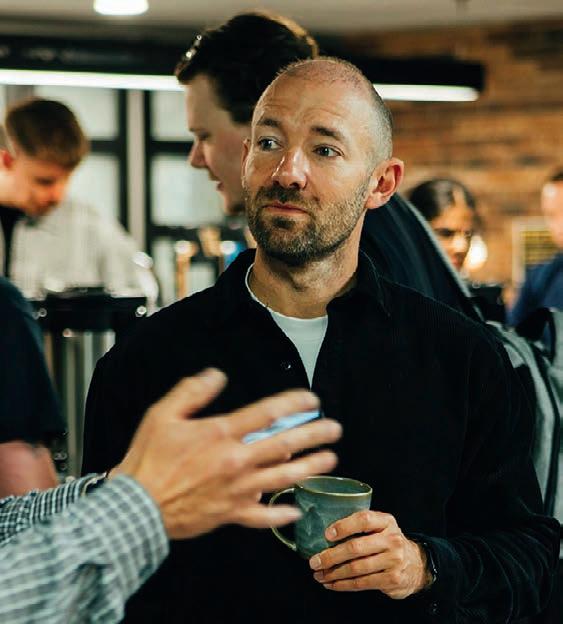
“Having representatives from a wide range of industries in one place has meant there’s a floor to share all thoughts, overcome any challenges anyone has and fully embrace the opportunities ahead.”
LikeMind Media chief executive Paul Ince gave a talk on striking the right balance between human and AI-produced content.
He said: “People want to know how to get better at AI and what they should be using it for. There are AI tools that are fantastic and can help small businesses in particular do things faster, reduce the cost of producing things like graphics and video.
“It's great for helping with corrections of things and makes things more accessible. People should see AI as a team member or tool to help them – some ideas for this, ideas for a blog or answer some questions, for example, but if we gave AI too much agency to act on behalf of an organisation when the groundwork hasn't been done

to train AI to accurately reflect, it’s like giving a crucial piece of work to a new employee with no experience of your organisation. They may produce something that looks great but doesn't have the essence of the brand.”
Digital consultancy owner Ian Lockwood, who gave a talk on best use of SEO with AI, said: “The value of conferences like this is enormous because you rarely have the opportunity to see businesses speak live, be able to ask questions of them and share information with other firms, who are almost certainly going to have similarities in their situations – you’re sharing knowledge and experience.
“If you’re new to AI, the best thing is to dive in – have a play with ChatGPT or Gemini, see how you can use them for your own business. Maybe you have data you’d like processed, content in spreadsheets that could be a chart, or want to draw analysis and get systems to do something for you.”
Take control of rising energy costs with tailored solar and battery systems designed to futureproof your business and protect your bottom line.
At Fusion Solar UK, we help UK businesses cut costs, boost energy security and unlock grant funding – because profit starts with energy independence.
The rising cost of electricity is now one of the biggest threats to business profitability. From manufacturers and farms to offices and workshops, companies of all sizes are feeling the pressure. With no price caps on commercial energy, unpredictability is the new normal – but there is a solution.
At Fusion Solar UK, we believe energy independence is no longer optional. It’s the key to stabilising overheads, protecting profit margins and building a more resilient business for the future.
We’re not your typical solar company. As a family-owned business rooted in the heart of the UK, we understand that no two businesses are the same. That’s why we offer bespoke solar PV, battery storage and EV charging solutions, designed to meet the unique energy needs of your operation.
Whether you're a farm battling rising production costs, a business park owner looking to add longterm value to your property, or a manufacturer concerned about grid reliability, our tailored approach delivers real results.
Solar isn't just about panels on a roof – it’s about taking control. Our expert team handles the process from initial site surveys and system design to installation, aftercare, and ongoing support. We also work with trusted grant specialists and offer commercial finance options, making it easier than ever to make the switch to renewable energy.
The benefits of energy independence speak for themselves:
• Protect your business from rising energy costs:
Generate your own clean electricity on-site and reduce reliance on unpredictable energy markets.
• Unlock grant funding: We partner with grant specialists to help you access available funding, often covering a significant portion of your project costs.
• Boost profitability and ROI: Solar systems typically pay for themselves in just a few years, delivering savings for decades to come.
• Enhance business sustainability: Future customers and stakeholders care about your green credentials. Solar demonstrates your commitment to a cleaner future.
• Battery storage maximises efficiency:
Store surplus energy and use it when needed, reducing grid reliance even further.
At Fusion Solar UK, our experienced team works with businesses across sectors including agriculture, manufacturing, property, hospitality, and more. Our recent projects include large-scale rooftop installations, groundmounted systems for farms and integrated solar and battery packages for commercial premises. We know switching to solar is a big decision – but with the right partner, it’s straightforward and hassle-free. From your first consultation to final commissioning, we provide honest advice, transparent pricing and a solution that works for your business.
If you’re ready to reduce costs, take back control, and future-proof your business with solar, now is the time to act. With energy prices climbing and grant schemes available, there’s never been a smarter time to invest in your business energy independence. Find out more at: www.fusion-solar.co.uk


By Paul Dolan (pictured), founder and director of Basecamp Financial Planning, which is based in Cromford.
Ifounded Basecamp in May 2023. With 25 years’ financial services industry experience, I felt the time was right to build a business that truly reflected my own ethos, ethics and principles.
Basecamp specialises in lifestyle financial planning. This approach goes beyond products and portfolios – it’s about helping people understand what they want from life, and then building a financial plan to support it.
‘We’ve built a strong reputation for ethical financial planning’
We work primarily with individuals planning for or navigating retirement, supporting them with pensions, investments and longterm strategies aligned to their values and goals.
What sets us apart is our commitment to ethical, values-led

The Chamber’s Employment Services team is one of the leading business and recruitment support departments in the East Midlands. It offers free recruitment support to help businesses find the right talent efficiently and at no cost, because it is completely funded by DWP. The dedicated team can assist with everything from advertising vacancies to prescreening candidates, ensuring a smooth and tailored recruitment process.
Contact: Blake.Worthington@emcdnl.co.uk


advice – for example, helping clients align their investments with climate or social concerns. We're regulated, transparent, and always focused on making financial decisions clearer and more empowering.
We’ve built a strong reputation for ethical financial planning and have recently started developing new services for purpose-driven businesses. These include
Business Peak District (BPD) is a free membership organisation for businesses in the Peak District National Park, High Peak, Staffordshire Moorlands and Derbyshire Dales. Its principal supporter is East Midlands Chamber. To find out more email: members@businesspeakdistrict.com
workplace pension reviews, employee benefits and financial wellbeing programmes.
This expansion builds on our existing strengths – it’s about helping businesses support their people in the same values-led way we support individuals.
The Peak District is a great place to do business – there’s a real sense of collaboration, and many organisations are genuinely valuesdriven. That said, access to advice and professional services can be limited compared to urban areas. We see a real opportunity to provide

accessible, trustworthy support.
The main challenge is visibility –individuals and businesses don’t always know that help is available locally. But that also presents a great opportunity to raise awareness and fill that gap.
Being part of Business Peak District helps connect us with likeminded businesses and professionals. It’s reassuring to be among others who share a commitment to the local economy and sustainable growth. As we look to support employers, these connections will be crucial.
The East Midlands PA Awards committee has revealed the finalists for 2025:
Administrative Professional of the Year: Carla Starmer, University of Leicester; Cheryl Hurst, Willmott Dixon; Emma Probett, University of Leicester; Heather Pinchbeck, MIH Group; Ione Vaughan, University of Nottingham; Nicole Riley, University of Leicester; Nikki Lindley, De Montfort University.
Business Support Manager of the Year: Carrie Laverick, University Hospitals of Leicester NHS Trust; Claire Tucker, BFY Group; David Parker, University of Leicester; Kirsty Moore, L.T. VA Services; Mandy Bradbury, Hollingsworth Solicitors; Rhianna Bircumshaw, Nottinghamshire Healthcare NHS Foundation Trust.
Lifetime Achievement Award: Cath Harrison, Bee-Assisted; Helen Connelly, Arup; Julie Dearden, Agilitas IT Solutions; Katy Straw, Browne Jacobson; Lynn Nock, Barclaycard; Mandy Bradbury, Hollingsworth Solicitors; Martine Cunningham, SENDIASS; Sam Hayto, University Hospitals Leicester NHS Trust; Sue Mawby, Shoosmiths.
Outstanding Contribution Award: Bryonie Styx, Browne Jacobson;

Emma Benner, Deloitte; Joanna Hudson, VISAV; Laura Nevay, University of Leicester.
PA of the Year: Adele Hyde, Alzheimer’s Society; Ami Hatchett, Browne Jacobson; Amy RobertsPlews, Alzheimer's Society; Chavonne Louw, Browne Jacobson; Danielle Bedford LDC; Jacqui Faulkner, University of Leicester; Natasha Livesley, Thera East Midlands; Rachel Rose, Scape Group; Stephanie Crawford, Sygnature Discovery; Vicky Gibsy, South Kesteven District Council.
Project Champion of the Year: Andrea Vear, University of Leicester; Hann Alexyz LeonardoCruz, Nottingham City Council; Heather Pinchbeck, MIH Group; Joanna Hudson, VISAV Limited; Laura Nevay, University of Leicester.
Rising Star Award: Bella Morris, Delta Global; Ellesha Garner, Eversheds Sutherland; Lucy
Oldershaw, Supportive Stories; Madalaine Norton, Nottingham Building Society.
Team of the Year: Arts, Design & Humanities Executive Support Team, De Montfort University; Executive Assistants, University Hospitals of Northamptonshire NHS Group; Field & Operations Support Team, Holland & Barrett; HLS Faculty Executive Support Team, De Montfort University; Mid Nottinghamshire’s Admin Leadership Team, Nottinghamshire Healthcare NHS Foundation Trust; The Magic Makers, L.T. VA Services.
Virtual Assistant Business of the Year: Hayley Grainger, Peak Lifestyle Management; Jennifer Heppell, Starchelle Communications; Lisa Tennant, L.T. VA Services; Lucy Hicks, Lucy Hicks Virtual Assistant; Lucy Oldershaw, Supportive Stories; Victoria Maynard, Victoria Maynard & Co.
Virtual Assistant of the Year: Beverley Edwards, BE Virtual; Cath Harrison, Bee-Assisted Ltd; Martine Downey, Bee Constructive VA.
The awards take place at Athena in Leicester on 2 October. For tickets email Daniel Skermer at daniel@ pa-forum.co.uk or Lesley Young at lesley.young@emc-dnl.co.uk





The shortlist for the 2025 Enterprising Women Awards has been revealed, recognising the outstanding achievement of women in the East Midlands business community.
Finalists across nine award categories – covering business areas ranging from social commitment to innovation – were announced at the 2025 Enterprising Women Summer
Networking Event, which took place at The Tipis at Whatton House near Loughborough. Those shortlisted will now go through to the awards night on 26 September at Winstanley House, on the outskirts of Leicester, where the recipient of the coveted Lifetime Achievement Award will also be named.
Enterprising Women co-chair Eileen Perry MBE DL said: “The Enterprising Women Awards















showcase the very best – the standout businesswomen of the East Midlands.
“The standard of entries this year has surpassed expectation and just blown us away. 26 September this year, when the awards will be presented, will be one very special evening, and it’s well worth getting a place reserved to be part of the celebration.”

Enterprising Women co-chair Jean Mountain added: “What I find so thrilling is the sheer brilliance of the entries that come in. As each year goes by, I think I’ve seen the best, but that bar is still lifting.
“Every woman that entered this year, in any of the categories has star quality, quite frankly, and I can’t wait to see who receives each award at the ceremony.
“It’s one of those fab, glitzy evenings where you feel like a superstar just being alongside these incredible women that the East Midlands can be so proud of.”
Lauren Cropper from 1284 Communications was revealed as a finalist for the Apprentice of the Year category.
She said: “I wasn’t expecting to hear my name read out. I’ve been at the business for just under a




APPRENTICE OF THE YEAR
Sponsor: Futures Housing Group
• Lauren Cropper 1284 Communications
• Amia Hill Cambridge & Counties Bank


• Sharna Young Cambridge & Counties Bank
• Sofia Coviello IMA Architects
• Hannah Livingstone Rolls-Royce
• Cat Mitchell True Talent
• Sophie Wragg Be Your Best Version
THE INNOVATION AWARD
Sponsor: Pick Everard
• Dr Ismini Vasileiou East Midlands Cyber Security Cluster
• Dr Dyneshia Johnson De Montfort University




BUSINESSWOMAN OF THE YEAR
Sponsor: Michael Smith Switchgear
• Charlie Dean Catering24
• Rachel Huxford MBE RAFA
• Mariam Smith Data Link


• Sonja Skelton West Special Fasteners
• Nipuni Karunaratne IVY TECH
DEVELOPING LEADER
• Lynn Johnson FSG Returnables
• Isabel Marsh HORIBA MIRA
• Jaimini Bharakhada Belgrave Neighbourhood Cooperative
SMALL BUSINESS OF THE YEAR
Sponsor: Unique Window Systems
• CMP Legal
• HLP Therapy
• IVY TECH
• TGIS Aviation
• Trans-Sport.TV

Sponsor: Sarah Higgins Corporate Coaching
• Ruth Johnson Bodie Hodges Foundation
• Tasmin Emery Cambridge & Counties Bank
• Nicola Chambers Dales Fabrications
• Victoria Cone Longbow Venues
• Blu Hardy Hardy Signs
FEMALE EMPLOYEE OF THE YEAR
Sponsor: Cambridge & Counties Bank

year, so it's a really good boost to my confidence and shows that I’m good at what I’m doing.”
Ruth Johnson from Bodie Hodges Foundation was revealed as a finalist in the Developing Leader category.
She said: “It’s so lovely to be recognised, especially as a nonprofit organisation, and I'm really excited to be at the Awards in September.
“The Enterprising Women Awards mean women are getting recognised, that we’re able to showcase what we’re doing, whether that’s in a small business,
large business or a charity like ours.”
Sarah Thomson from De Montfort University was revealed as a finalist in the Social Commitment Award category.
She said: “I felt really emotional hearing my name as a finalist. A lot of the speakers said it was a really strong field this year with lots of entries.
“I’ve spent the day with some amazing women, so to be shortlisted from a group of peers like this is just a real honour.”
• Dimple Chohan Digital Planning
• Katie Angrave The Maynard, Longbow Venues
• Emma Snow Mackworth Vehicle Conversions
• Alexandra Carr PPL PRS
• Trace Voss Voluntary Action Leicestershire
FEMALE ENTREPRENEUR OF THE YEAR
Sponsor: Freeths
• Amy Stroud Exploding Sweets
• Emily Cardy EC Manufacturing Group
• Gill Heppell PerCurra Franchising
SOCIAL COMMITMENT
Sponsor: Tomato Energy
• Sarah Thomson De Montfort University
• Lindsey Randle HORIBA MIRA
• Justine Flack Howes Percival LLP
• Trusha Lakhani Great Business Matters
• Ann Fomukong-Boden Kakou Technologies
TEAM OF THE YEAR
Sponsor: Breedon Consulting
• Leadership & Management Team Charnwood Nursery & PreSchool Group
• Research, Business & Innovation Team De Montfort University
• HR & Resourcing Team HORIBA MIRA
• Customer Experience PPL PRS
• The Team CMP Legal
The Lifetime Achievement Award, which will be announced on the night, is sponsored by Paradigm Wills & Legal Services.
For tickets visit: is.gd/JEcVlL







The 2025 Generation Next Awards will be taking place just as Business Network goes to press – and all the winners will be featured in the next edition of the magazine, which is out at the start of September.
In the meantime, Generation Next chair Scarlett Canavan (pictured) shares her thoughts on why the awards – and the Chamber network for young executives –are so important.
As Chair of Generation Next, it’s a real honour to be part of celebrating the next wave of talent across our region.
With the 2025 Generation Next Summer Festival and Awards here, there’s a real buzz in the air – and with good reason!
I just want to start by saying a massive thank-you to everyone who entered or nominated this year. The standard was incredible, and we can’t wait to celebrate with you all properly this July.
These awards are confidence builders, game changers and platform creators.
Year-after-year, we see our winners and finalists go on to grow businesses, launch social initiatives,
switch careers, speak at major events, and even return to mentor or support the next generation of applicants. It’s proof that when you shine a spotlight on young professionals and give them a space to be seen, heard and celebrated, amazing things happen.
The awards evening is genuinely one of the most feel-good dates in the calendar. It’s informal, fun and filled with good vibes. Think garden party meets business awards – no black tie or pressure, just great people, great food and a celebration of what’s possible when ambition meets opportunity.
And if you need any more convincing, here are my top five moments from last year’s awards:
1. The weather – we ordered sunshine, and the sun delivered.
2. Street food and cocktails in the courtyard – networking at its finest.
3. The proud colleagues and bosses beaming from the sidelines –what it’s all about.
4. Watching winners’ faces light up as their names were read out –unforgettable.
5. Leaving with lots of brand-new connections.
This summer, I’m looking forward to doing it all again – and even better, standing alongside the amazing team who make Generation Next what it is.
To our finalists: congratulations. You should be so proud.

The 2025 sponsors are Derby College Group, Nottingham Trent University, trentbarton, East Midlands Manufacturing Network, University of Derby, Hardy Signs, Futures Housing Group, East Midlands Chamber, Enterprising Women, Vision West Nottinghamshire College, Leicester College and Express Recruitment.
Generation Next has teamed up with a successful McDonald’s franchisee for a morning session that will provide insights into the opportunities for running a fast-food burger restaurant.
The Generation Next Networking Breakfast takes place at McDonald's, in the Meteor Centre, Breadsall, Derby, from 10.30am-noon on Thursday, 18 September.
The guest speaker will be Samuel Clapham, who is the area manager for multi-millionpound turnover Sherwood Restaurants, which has a number of McDonald’s franchises.
He will share some of his stories about running a restaurant business and what it takes to become a franchisee.
Generation Next manager Kate Nemeth said: “Join us for a morning of meaningful connections, inspiring insights, and delicious breakfast at our Generation Next Networking Event – hosted at McDonald’s, just steps away


from Derby’s Odeon Cinema. Fuel your morning with a classic McDonald’s breakfast as you network with like-minded young professionals and rising leaders from across the East Midlands.
“This relaxed but dynamic event is your opportunity to grow your professional circle, share experiences, and gain exclusive insider knowledge on the franchising world.
“Hear firsthand from Samuel Clapham, a rising leader within McDonald’s franchise, as he shares his personal journey through the business – from early career beginnings to his ambitions of running the top-performing franchise in the region.
“Samuel will pull back the curtain on what it takes to enter the McDonald's franchise system, the challenges and opportunities of the role, and how he’s leading innovation and excellence at Sherwood Restaurants Ltd.
During the event, we’ll be spotlighting and sharing your inspiring journey towards becoming the number one franchise.”
As well as networking there will be opportunities for network members to ask questions and share their own business journeys.
For details visit: www.generationnextemc.co.uk


Members of the Leicester and Leicestershire branch of the East Midlands Manufacturing Network gained an insight into the potential benefits of knowledge transfer partnerships (KTPs) between industry and academia.
The quarterly meeting in the De Montfort University Innovation Centre heard about benefits for industry ranging from gaining tens of thousands of pounds of expertise for projects, to using state-of-theart university facilities and being eligible for R&D tax credits.
‘There’s very little the programme can’t give you advice on’
The national KTP scheme is funded by Innovate UK, and while both of Leicester’s universities offer the service, regional businesses can look to universities anywhere in the country for help.
Businesses can gain up to £90,000 to £100,000 of support a year, and the universities benefit by staff and researchers gaining onthe-job experience with industry.
Stuart Hilton, head of commercial partnerships at De Montfort, told the network meeting that KTPs had been running for 50 years, and DUM success stories included ensuring chemicals used in NHS garment cleaning were safe,


designing and making a hijab which is safe for women police officers to wear on the streets, and using hemp to develop flameretardant upholstery.
He said: “There’s very little the programme can’t give you advice on because it’s probably been asked about it before.
“Universities love KTPs because they help us as well as the partner companies. It’s applied science –finding a problem and finding a way to help.”
Angela Orton is managing director of Leicester-based Structural Adhesives, which develops high-performance bonding for clients around the world in areas such as construction, aerospace, automotive.
The business was recently awarded the prestigious King’s Award for Enterprise in Innovation for its pioneering work in fire-rated adhesive technology, cementing its reputation as a leader in the field.



She spoke about how her company was benefitting from a two-year KTP with Leicester University – valued at £200,000 –which included developing “debondable” adhesives which can be unstuck later down the line to allow the things they hold together – such as high-tech instruments –to be easily taken apart and recycled.
The business is currently looking at ways of applying that to space missions, so components can be easily removed and fixed in space.
She said: “We’re working with the University of Leicester as a springboard to build our R&D, and we’ve worked with Loughborough on past products.
“The relationship is almost like osmosis, with the benefits going both ways – we’re learning a lot and our KTP associate Morgan Bates is learning a lot too because of the shared opportunities for both of us.
Dales Fabrications, in Ilkeston, Derbyshire, has been involved in the design and manufacture of aluminium building products since it was founded by Frank Dales in 1977. It is now run by directors Colin Dales, Andy Purdy, Nicola Chambers, and Tom Strickland and has 39 employees, specialising in everything from producing eaves systems, solar shading, copings and rainscreen cladding.
Although experienced in their field, the Dales Fabrications team had limited experience in networking with other businesses in the region, so managing director Andy Purdy and finance director Nicola Chambers joined the East Midlands Manufacturing Network

(EMMN) when the Derby group started in 2022.
Dales Fabrications has actively engaged with EMMN through regular attendance at Derby forums and the regional meeting – and both Andy and Nicola have said
they find value in attending the meetings together, using them as a platform to exchange ideas and reflect on business strategies. Through these meetings the team has also built trusted connections, including with Derby
“We’re now looking into areas we would not necessarily have looked at because it has given us the knowledge and understanding to start looking at space.
“Debondable adhesives, which is what the KTP covers, have the potential to be used with rare earth metals that go into critical electronics, which are currently hard to remove and recycle because of the epoxy they are embedded in.
“Debondable adhesives can replace that, and can also be used in automotive and aerospace. It’s a common-sense solution and if you imagine the cost of sending something to space, it could mean you can mend it in situ.”
Innovate UK has supported more than 14,000 business through KTPs and invests £50m a year in the programme with 800 projects currently running.
For future EMMN meetings visit emmn.co.uk
College which has helped them identify tailored apprenticeship programs and supported recruitment efforts. Additionally, Nicola learned about Erewash Council’s R&D grant opportunity through EMMN, which has resulted in significant funding for new capital equipment.
The company has also benefited from attending Accelerator training workshops and webinars, which have enhanced leadership, management, HR practices, and sustainability efforts across the business.
As Chamber members, Dales Fabrications has used various business services provided to members, further bolstering their operations.

9.30-4pm, 9 July, at the Mercure Grand Hotel, Leicester.
This free, in-person workshop is for anyone who is responsible for managing a business website or for digital marketing in their company. It is aimed at beginner to intermediate users, even if they don’t yet have a website.
As a funded event it will be subject to eligibility questions during booking.
For details visit: is.gd/dZ761d
For details of a similar event in Nottingham on 16 July visit: is.gd/prJltK
DERBYSHIRE BUSINESS HUB
8.30-10.30am, 10 July, at the East Midlands Chamber offices, Chesterfield.
This will bring together people from local businesses in a relaxed environment, providing an opportunity to build business networks.
Hosted by East Midlands Chamber, and organised by Chesterfield Rotary, breakfast rolls, fruit and drinks are included in the £5 ticket price (plus-Eventbrite fee).
For details visit: is.gd/EBKJoB
9.30-4pm 23 July, Cromford Mills, Matlock. Providing essential leadership and management skills needed to help businesses grow, with practical tips to build and sustain a high-performance team.
As a funded event it will be subject to eligibility questions during booking.
For details visit: is.gd/vqlc0e






The best businesses across Derbyshire, Nottinghamshire and Leicestershire are being invited to put themselves forward for the East Midlands Chamber Business Awards 2025/26.
Entries are now officially open for the awards, which are set to take place early next year, with 12 categories recognising standout businesses in areas such as customer service, CSR leadership and people development.
Past winners include Kranlee Logistics, AtkinsRéalis, Longbow Venues, Murphy & Son, Howes Percival, West Nottinghamshire College and Browne Jacobson.
Finalists that make the shortlist will be revealed at the Chamber President’s Celebration of Success – a high-profile event on 9 October, which marks the beginning of the judging process.
East Midlands radio hosts Jo and Sparky –long established for waking up hundreds of

thousands of people across the region – have been confirmed as hosts at all three award ceremonies.
Sponsors confirmed so far for the 2025/2026 Awards include RandalSun Capital, Rolls-Royce, Amazon, emh Group, University of Derby, De Montfort University, Derby College Group, Howdens, Eversheds, Express Recruitment and ER Recruitment, with more to be announced shortly.
‘The Chamber’s Business Awards are about the most coveted you can get in recognising outstanding business skill and innovative thinking’
Chamber chief executive Scott Knowles said: “It always strikes me that, amid a trading landscape that’s been riddled with challenges for businesses, whether the high cost of doing business, price pressure, corporate taxation or global tariffs to name a few, the sheer resilience and resourcefulness of our world class firms across the East Midlands is always remarkable.
“The Chamber’s Business Awards are about the most coveted you can get in recognising outstanding business skill and innovative thinking.
“When achievement drives growth – and that could be anything from approach to people, sustainability, digital technology or developing future business talent through an apprenticeship – this should be recognised.
“We’ve secured three superb venues and I’m delighted that radio personalities Jo and Sparky – big advocates for the East Midlands – will host these prestigious events.


EAST MIDLANDS CHAMBER BUSINESS AWARDS 2025/26 CATEGORIES:
• Digital Transformation Award
• CSR Leadership Award
• Collaboration of the Year Award
• Green Business of the Year Award
• Commitment to People Development Award
• Apprenticeship of the Year Award
• Excellence in Customer Service Award
• Education and Business Partnership of the Year Award
• Micro Business of the Year Award
• Small Business of the Year Award
• Innovation of the Year Award
• Business of the Year Award
“With the East Midlands a shining example on the UK and world stage for excellence in manufacturing, the creative industries and embracing innovation, I’m very much looking forward to this year’s ceremonies.”
Presenters Jo and Sparky said: “We are so excited to be hosting the Chamber’s Business Awards. As big supporters of local businesses for years on our radio show, we’ve been very lucky to meet and visit some of the great businesses across our patch.”
Alice Houghton is area operations manager at Longbow Venues which operates pubs and hotels including The Peacock at Rowsley, The George at Hathersage and The Ashford Arms in Ashford-in-the-Water.
It won the outstanding growth and excellence in customer service categories at last year’s Derbyshire Awards.
Alice said that – and personally winning the emerging leader award at the Chamber’s 2024
Enterprising Women Awards – were huge milestones for her and the business.
She said: “It wasn’t just a recognition of past efforts – it was a catalyst for everything that followed.
“The recognition I received last year not only validated my path but gave me the confidence to keep pushing boundaries and striving for more.
“It continues to inspire me to mentor others, create opportunities for growth within my teams, and advocate for leadership that values people, performance, and progress.”
A spokesman for Derby County FC, which will host the Derbyshire Awards, said: “Everyone at Derby County is really excited to be hosting The East Midlands Chamber Derbyshire Business Awards here at Pride Park Stadium.
“We look forward to welcoming all attending guests on the evening.”
To enter the 2025/26 awards visit: www.emcdnl.co.uk/services/business-awards
CEREMONY DATES & LOCATIONS
LEICESTERSHIRE
26 February 2026 – Leicester City Football Club
NOTTINGHAMSHIRE
12 March 2026 – Nottingham Belfry
DERBYSHIRE
26 March 2026 – Derby County Football Club
Entries need to be submitted by 19 September. To enter or find out more visit: www.emcdnl.co.uk/services/business-awards
If you would like your business to be associated with the awards as an official partner contact: caroline.lucy@emc-dnl.co.uk

Britain’s first female jet fighter Dr Jo Salter




Britain’s first female jet fighter – who went on to be voted one of the BBC’s 50 most inspiring women in the world – will share her stories as guest speaker at the Chamber president’s her 2025 Celebration of Success this autumn.
Dr Jo Salter MBE was rejected twice by the RAF – when women weren’t allowed to fly – before going on to change the test policies for new recruits in the air force. She went on to help create a stronger and more modern RAF as the first female leader of an all-male squadron – and was even cited by Tom Cruise as one of his inspirations for Top Gun: Maverick
The celebration takes place at The Renaissance at Kelham Hall, in Nottinghamshire, on Thursday, 9 October, and will be an opportunity for businesses to network with drinks and reflect on their successes so far in 2025. It will also include the announcement of the finalists for the three Chamber Business Awards covering Leicestershire, Nottinghamshire and Derbyshire. Each of those named will go through to the three awards nights set to take place next February and March.
Chamber president Dawn Whitemore said: “It’s an opportunity to share with members the work our achievements over the previous months – and plans for the coming months – and a chance for the region’s business leaders to get together and network.
“Above all that it’s a chance for us all to celebrate the region as a whole and the Chamber’s vital role within it.”
To attend the President’s Celebration of Success, visit the events page on the East Midlands Chamber website.
For sponsorship opportunities email the Chamber’s head of commercial partnerships Caroline Lucy at caroline.lucy@emc-dnl.co.uk


www.emc-dnl.co.uk/sustainability
Leicester sustainable travel consultancy GO Travel Solutions has been reappointed as travel plan coordinators for Fosse Park for a minimum of three years.
The business will continue to manage and develop the shopping park’s sustainable travel initiatives for staff, while widening its focus to explore similar options for shoppers and other visitors.
GO Travel Solutions has managed the Travel Plan since 2021, working with retailers to introduce and develop the successful “Getting To Work” scheme for staff.
The package of low-carbon transport incentives and resources has helped reduce the number of employees driving to work at Fosse Park – with an annual staff travel survey suggesting single-car occupancy has gone from 72% in 2018 down to 42% in 2024. Within the same period, staff commuting by bus has risen from 11% to 32%.
Phil Saunders, project manager at GO Travel Solutions, said: “It’s great to continue our partnership with the team at Fosse Park and further our development of sustainable travel initiatives. We look forward to building on the success and learnings of the Getting To Work scheme to achieve a similar impact on shopper travel behaviour too.”
The University of Leicester has put together a team of experts devoted to helping organisations become more sustainable.
The newly launched Centre for Sustainable Organisations harnesses the expertise of academics from various disciplines who are keen to work with employers to help successfully tackle societal, environmental and economic sustainability issues.
Centre director Dr Hana Trollman said: “Organisations face a raft of sustainability issues which, if they don’t address, could make the difference between success and failure.
“The challenges they might face include relying on a business model which isn’t resilient enough to overcome issues when something goes wrong; how to cope with an ageing workforce; structuring equitable supply chains; enabling sustainable consumption and the need to develop a robust strategy and meaningful key performance indicators.
“Some or all of these issues can be key to an organisation’s success, and we felt, with the insight and expertise we have within the University, a new research centre would be the best way for us to support organisations keen to futureproof themselves.”
Email: ht203@leicester.ac.uk

MAIN PICTURE: The East Midlands Investment Zone has helped companies in areas such as designing aircraft maintenance schedules
INSET: Claire Wards





The East Midlands Investment Zone (EMIZ) has completed its first year of grants supporting businesses at the forefront of the UK’s green industrial future.
More than £500,000 in funding was awarded to a cohort of 15 “fast-start” pilot projects – each pairing businesses with university-based researchers to accelerate the development of profitable, low-emission technologies.
They were part of the first phase in EMIZ’s 10year, £160m commitment from government to transform the East Midlands into an engine for innovation-led growth, using grants, business rate retention, and tax relief to support Net Zero innovation.
‘We have seen huge progress across growth sectors such clean energy, green construction, and sustainable manufacturing’
The East Midlands Combined County Authority (EMCCA) awarded the grants across EMIZ’s four priority sectors – zero emissions propulsion, clean energy, green construction, and sustainable advanced manufacturing.
The projects were delivered in collaboration with researchers from the University of Nottingham, University of Derby and Nottingham Trent University.
Claire Ward, mayor of the East Midlands, said: “During the first year of the programme, we have seen huge progress across growth sectors such clean energy, green construction, and sustainable manufacturing.
“This translates into exciting, skilled, and wellpaid jobs for the people of the East Midlands.
This is how we make our region the best place in the UK for businesses to start, scale, and stay.”
Local growth minister Alex Norris MP said: “The East Midlands has an incredible industrial history. Now we want to build an amazing future for the region, realising its potential and putting it at the heart of our mission to grow the national economy.
“Visiting the Hydrogen Propulsion Lab construction site in Nottingham, I saw first-hand the amazing work already underway to build on the area’s strengths in green technology. And the East Midlands Investment Zone, backed by government funding, is supporting brilliant projects across the region, giving them the tools they need to create jobs and drive growth.”
Professor Jane Norman, president and vice chancellor, University of Nottingham, said: “These projects show the East Midlands at its best – bringing together ambition, research excellence, and industrial know-how to unlock new opportunities.”
The investment zone programme is overseen by EMCCA, and complements regional initiatives including the freeport and the forthcoming EMIZ Investment Strategy and Local Growth Plan.




UK aerospace companies, including Derby’s Rolls-Royce are set to benefit from the removal of tariffs as work continues on a UK-US trade deal.
The Government said UK vehicle makers – such as Toyota in Derbyshire – will also benefit under a newly lowered 10% tariff quota following talks between Sir Kier Starmer and Donald Trump which could potentially hundreds of millions annually for plane and car makers, protects tens of thousands of jobs.
The US has committed to cutting tariffs on UK aerospace goods such as engines and aircraft parts from the general 10% tariff being applied to all other countries.
The Government said the deal would help make companies such as Rolls-Royce more competitive, allowing them to continue to be at the cutting edge of innovation.
The UK is the only country to have secured a 10% car tariff with the US – down from 27.5%.
Rolls-Royce executive Tufan Erginbilgic said: “The tariff exemptions on aircraft, aero engines and parts that have been secured are truly significant.
“The US is a vitally important market for Rolls-Royce and we welcome the strengthening of trade ties between the two countries.
“Aerospace is an engine for growth for the global economy.
“Rolls-Royce plays a critical role in ensuring the UK has highly-differentiated and world-leading capability in aero-engine technology. With strategic investment and long-term planning, it delivers economic growth, skilled jobs and exports.”
William Bain, the British Chambers of Commerce head of trade policy, said it was “music to the ears” of affected sectors.
He said: “They are desperate for tariff relief and lower costs, and this new Executive Order should deliver that.
“Both Governments should now build upon this current deal to secure an agreement on digital trade to make transAtlantic trade cheaper, speedier and more efficient.”



The founder of Leicester-based LED lighting specialist Ventola Projects said the business was thriving on US exports despite months of uncertainty over Donald Trump’s tariffs.
Chief executive Mick Ventola (pictured) said the company had completed a significant number of lighting installations across the US and was experiencing one of its busiest periods of the year – all, he said, while remaining competitive and avoiding passing on additional costs to clients.
‘Exports account for 90% of our turnover, so we understand just how critical they are to long-term sustainability and growth’
new Hoosier Entertainment Center In Bloomington, Indiana.
Other projects, he said, include lighting installations at Fannin Lanes in Mississippi, and at venues in Tennessee, and Toronto, Canada, as well as in Kentucky, Ohio, and other parts of the US.
He said it comes as the company has also expanded its Leicester headquarters: “It’s a really exciting time for us at the moment, and I’m incredibly proud of how well exports are performing in the US and Canada – as well as in Europe, the Middle East and soon in Australia, and New Zealand.

“We’ve also had an influx of enquiries from both UK and other international clients, so it’s not just existing business driving growth, it’s growing recognition of our capabilities and reputation in new markets.
Mick said: “These have been remarkable weeks for us as we continue to expand our operations across North America.
“Despite the uncertainties posed by recent tariff increases, we have chosen not to increase our prices, ensuring that our clients receive the best value without compromising on quality.
“Our dedicated team in the USA has worked tirelessly to maintain our high standards, and we are proud of the positive impact our projects are having in communities across the continent.”
He said the team had recently played a part in the refurbishment of family Bowl Incline, a bowling and family entertainment centre in Lake Tahoe.
The company’s VAvR LED lighting system and LED displays are currently being installed at the
“I know it’s a nerve-wracking time for many businesses involved in exports, with so much uncertainty in global markets and shifting trade dynamics.
“For us, exports account for 90% of our turnover, so we understand just how critical they are to long-term sustainability and growth.
“What’s made the difference for us is our strong foundation of trusted relationships with international partners, combined with a commitment to innovation and consistently delivering high-quality products.
“That combination has allowed us not only to weather challenges but to expand into new markets and build a resilient export business.”
Ventola Projects provides bespoke lighting for businesses, offices, residential projects, outdoor installations and entertainment centres.



East Midlands Chamber has cautiously welcomed measures set out by the Chancellor in the Comprehensive Spending Review – but warned that funding must be fully costed to prevent tax hikes.
Announcements in the first spending review since 2021 included £2bn into AI and £1.2bn into apprenticeships and training, along with increased investment in housing, the NHS and Defence.
‘With businesses still absorbing the announcements of the last Budget any additional cost would be painful’
The Government has also committed to put more than £2.5bn in nuclear fusion including progressing with the STEP programme (Spherical Tokamak for Energy Production) – the world-leading plant in Nottinghamshire, which will create thousands of jobs and could one day unlock limitless clean power.
A further £2.5bn-plus will enable one of Europe’s first small modular reactor programmes, with Rolls-Royce SMR in Derby

How a STEP prototype fusion energy plant in the East Midlands might look
selected as preferred bidder to partner with Great British Energy – Nuclear, subject to relevant approvals.
Chamber director of policy and insight Richard Blackmore said: “The starting position is that all investment is welcome. However, in what’s been a tough period for businesses, investment in defence, new homes and infrastructure is welcome but it’s essential that spending has been properly costed, so there’s no risk of additional cost burdens for business.
East Midlands Chamber has called for a “more balanced” funding allocation that covers the whole region, while welcoming transport infrastructure investment announced for Derbyshire and Nottinghamshire.
It comes after the Chancellor unveiled funding through regional mayors – including East Midlands Combined County Authority (EMCCA) mayor Claire Ward – to improve rail and bus connections across the country. Leicester and Leicestershire are not part of EMCCA.

Projects expected to benefit include:
• Trent Arc – described by EMCCA as one of the East Midlands’ most “immediate and investable” opportunities. The funding will support improved rail, road and bus connections spanning Derby and Nottingham, the Freeport, and sites such as Infinity Park Investment Zone and Ratcliffe-on-Soar, with the potential to deliver 40,000 new jobs, 30,000 homes, and contribute £2.4bn to the economy. It also includes East Midlands
“With businesses still absorbing the announcements of the last Budget – which has meant higher staffing bills from things like raised National Insurance contributions and a higher national living wage – any additional cost would be painful.
“Rolls-Royce getting backing to build small modular reactors is good news for Derby’s economy. For businesses looking to recruit, news of investment in apprenticeships and training is encouraging, especially when businesses are finding it so hard to recruit. Nearly seven out of 10 East Midlands struggle to fill positions.”
Claire Ward, mayor of the East Midlands, said: “After many calls and meetings with the Government, I have secured £2bn for transport to get the region moving.
“There’s also £2.5bn to convert West Burton Power Station into one of the world’s first fusion power plants, creating thousands of skilled jobs.
“The increase in our defence spending will benefit our local world-leading businesses in manufacturing and engineering, and the smaller traders that supply to them.
“On top of that, the largest injection of cash into the NHS will help bring down local waiting lists.”

Ratcliffe power station – scheduled for demolition


Residents, business leaders and community leaders are being encouraged to have a say on the future of local councils in Leicester, Leicestershire and Rutland.
Views are being sought on proposals to reduce the number of councils in the area and replace them with bigger unitary authorities as part of the Government’s devolution agenda. Three different proposals have been drawn up by the existing councils in the area.
The district and borough councils in Leicestershire and Rutland County Council have submitted an interim “North, City, South” plan to create three equally-sized unitary councils for the area.
The councils say people and places would be at the heart of their proposal which focuses on maintaining “close contact with communities”.
People can comment on the plan up to 20 July 2025 by visiting www.northcitysouth.co.uk
Councillor Pip Allnatt, leader of Melton Borough Council – speaking on behalf of the leaders of the Leicestershire district and borough councils and Rutland County Council – said: “Councils in the area are facing the biggest change in over 50 years and it is vital our communities are involved in helping to shape the future of local government.
“We encourage people, businesses and organisations to take part in the survey and

tell us their views on our plans. We do not think the current system is broken but we recognise the Government’s intent on change.
“This is the second time we have asked for views and earlier this year more than 4,600 people and organisations responded to our original survey to help inform our interim plan. We also had meetings and conversations with hundreds of other stakeholders.
“Our councils which have proposed the North, City, South plan have made a pledge to make sure all voices are heard in this process and we will continue to make strenuous efforts to gather views from our communities and partners.
“Please have your say.”
The North, City, South plan would see:
• A North Leicestershire and Rutland council covering Charnwood, North West Leicestershire, Melton and Rutland County Council
• A South Leicestershire council for Blaby, Harborough, Hinckley & Bosworth and Oadby & Wigston
• Leicester City continuing as a unitary authority
Leicester City Council and Leicestershire County Council have submitted two different proposals to central government.
Intermodal Park, home to major employers such as Toyota.
• The Chesterfield-Staveley Regeneration Route (CSRR) – a project linking North Derbyshire with South Yorkshire and Lincolnshire.
• Improvements to the A614/A6097 in North Nottinghamshire.
Chamber director of policy and insight Richard Blackmore said: “While improving infrastructure is desperately needed and certainly a welcome boost for Derbyshire and Nottinghamshire, it’s essential that there’s a fair and balanced approach to upgrading transport links that brings economic growth across all of the wider East Midlands region. Projects that would upgrade Leicester and Leicestershire’s transport
Derby has been awarded a prestigious Purple Flag accreditation for its evening and nighttime economy for the 13th year in a row.
The award recognises the work of the Cathedral Quarter, St Peters Quarter Business Improvement Districts and Derby City Council.
Derby’s continued success reflects the strength of its evening offer, including its dining and cultural venues and its focus on visitor safety and well-being.
Brad Worley, BID manager for both the Cathedral Quarter and St Peters Quarter, said: “The Purple Flag award represents a celebration of the safety, liveliness, and variety found within the evening and night-time attractions of our city.
“It’s a proud achievement for Derby and a reflection of the dedication and cooperation shown by so many groups working together to make our city centre thrive after dark.
“This year was especially important with the opening of Vaillant Live and Derby Market Hall adding to our brilliant evening economy offer.”

links must not be overlooked, in just the same way that electrification of the Midland Mainline should not have stalled, but for Derbyshire and Nottinghamshire the creation of new jobs, new homes and improved connectivity is a good step forward.”
EMCCA said the programme had the potential to unlock 100,000 new jobs, deliver 52,000 homes, and generate a £4.6bn boost to the economy.
Mayor of the East Midlands Claire Ward said: “This is the largest transport investment our region has seen in a generation.
“As mayor of the East Midlands, one of my most important responsibilities is to ensure that Government sees this region through the eyes of those who live, work, and travel here, and to make sure we are treated as a national priority.”



By Márcio Leiria (pictured), marketing and creative manager, Ampetronic | Listen Technologies

Inclusion is not just a moral imperative. It is a business one. The more connected and collaborative our workplaces become, the more we rely on clear communication. Yet for millions of people, what seems like a standard meeting, training session or induction is filled with barriers that many of us never notice.
I have worked in the assistive listening sector for eight years. In that time, I have seen how often hearing accessibility is left out of workforce planning. Not through neglect, but because it is invisible. Hearing loss is rarely talked about openly, and even less often planned for in development strategies. But if we are serious about creating environments where people can engage, grow and contribute fully, we need to start treating accessible audio as essential.
According to the World Health Organization, more than 1.5 billion people worldwide live with some level of hearing loss. That is not a niche. It includes people of all ages, including many already in work, and the number is growing. Yet hearing needs are still often seen as individual problems to be solved with hearing aids or personal devices. The reality is more complex.
Even with the best technology, hearing aids struggle in group settings, noisy rooms, and when there is distance between the speaker and listener. That is exactly the kind of environment where many of our most important communications happen. Team briefings, hybrid meetings, training sessions, internal events. Without support, these interactions can quickly become sources of stress and exclusion.
Workforce development is about giving people the tools, knowledge and environment to do their best work. That includes access to training, clarity in communication, and the ability to contribute equally.
Imagine joining a company and missing half of the

onboarding information because the training room does not have any form of audio support. Or sitting through a town hall where you can see the speaker but cannot quite make out what they are saying. It is not just frustrating. It affects performance, confidence and long-term engagement.
The way we work has changed, and quickly. Hybrid meetings and virtual training have become standard, but they come with new audio challenges. Background noise, poor-quality microphones and variable internet connections make communication harder even for those without hearing loss. For those who do, it is an uphill battle.
The good news is that making audio accessible is not complicated. It is about including hearing support in the same way we include ramps, lifts or captioning. It does not require rethinking everything. It just means designing communication with everyone in mind.
That might mean ensuring meeting rooms are fitted with assistive listening support, that training facilitators are briefed on inclusion, or that events have clear options for audio access. It also means recognising that hearing support is not only for people with diagnosed hearing loss. Many people benefit from clearer audio, especially in more challenging environments.
Most importantly, it is about shifting the mindset. Hearing inclusion is not an optional extra. It is part of inclusive design. It enables people to fully engage, learn and contribute. That is not just good for the individuals. It is good for business.
We are making progress in recognising the importance of diversity, equity and inclusion at work. But inclusion does not stop at what we see. It has to include what we hear.
As organisations continue to invest in training, wellbeing and workplace culture, audio accessibility should be part of that conversation. Because no matter how good the content is, it will not make a difference if people cannot hear it.

‘Hearing
loss is rarely talked about openly, and even less often planned for in development strategies’









DCG delivers high-quality academic, vocational and technical education that empowers people to achieve their ambitions, while providing employers across the Midlands and beyond with the talented workforce of tomorrow.
Through a dynamic and responsive curriculum, it predicts and serves the needs of its business and civic communities. Students of all ages and backgrounds are prepared for positive destinations in the next stage of their lives, whether that be further study, the world of work, entrepreneurship or independent living. They leave DCG ready to contribute to society as responsible citizens.
The group’s portfolio of educational programmes and skills solutions is underpinned by thriving partnerships with employers, shaped by comprehensive market intelligence and informed by liaison with key stakeholders such as the D2N2 Local Enterprise Partnership.
A truly diverse organisation, the Group is formed of four Colleges – the Roundhouse, the Joseph Wright Centre, Broomfield Hall and the Community College, Ilkeston. Every year it caters for thousands of learners spanning school pupils on pre-16 programmes, post-16 students pursuing academic and technical pathways, apprentices at all levels, higher education students, and adults seeking career progression, upskilling and reskilling.




For employers, issues such as the ongoing skills shortage, ageing workforces and stiff competition for the best talent means that you might not have the workforce to take your business into the future.
This is where strategic workforce planning comes in. In essence, this means analysing your current staffing levels and anticipating your future needs to ensure that you have exactly the right people for the job. As well as helping you uncover the training needs of your current employees, strategic workforce planning will also help you align your recruitment strategy with your long-term goals.
But where to start? Business Network offers its top tips.
If strategic workforce planning is about making sure your people are able to deliver your company’s goals, a natural first step is to identify the short-, medium- and long-term objectives. Once you’ve figured out what you want to achieve, you can identify what you need in terms of the right skills and talent. It’s important to include your stakeholders, HR and senior management in this stage, as they can all help you identify and outline your goals and the skills you need.
What kind of shape is your workforce in? What people and skills do you already have in your organisation and, more importantly, what skills are missing? When it comes to analysing your current workforce, there are two key areas to focus on:
Quality: Assess your employees on their current performance and future potential. Is anyone holding you back? Conversely, are there any breakout stars brimming with great ideas?
Quantity: Assess how big your workforce is, paying particular attention to employee turnover, the effectiveness of your recruitment campaigns and the frequency of internal promotions.
Once you’ve a clearer idea of how many staff you have and the skills you have on board, you will be able to better identify current and future skills gaps.
If, for example, you have many staff of retiring age, you can begin to seriously think about how you can fill the gaps they’ll leave behind. Will it be more economical to promote and train existing staff, or do you need to bring in new blood with fresh ideas in order to reach your goals? As well as traditional recruitment methods, there are other options such as apprenticeships and training schemes.
How will future technology, automation and other advancements affect your workforce needs? Of course, you can’t predict the future, but strategic workforce planning should help you better anticipate future trends.
It’s perhaps unavoidable that some roles will become obsolete, but rather than making entire teams redundant (which would have a massive impact on staff morale) you can begin a training and re-skilling programme to move key players into new roles in order to keep the best talent.
Remember that strategic workforce planning requires frequent monitoring. The modern business environment is constantly changing – as technology adapts, so does the customer. If you want to stay ahead of the competition, you need to make sure you always have the best possible workforce at your disposal.
‘Once you’ve figured out what you want to achieve, you can identify what you need in terms of the right skills and talent’




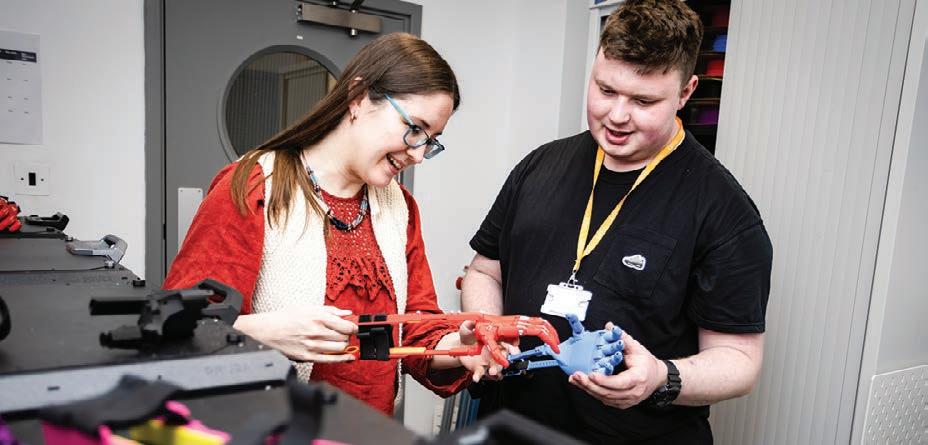


At Homefield, we don’t just educate –we create futures. As a charity and specialist college, we empower young people who have learning and communication disabilities to gain the skills, confidence and experience they need for independence, employment and active citizenship.
Hiring autistic and disabled employees boosts innovation, loyalty and team culture. Yet, 85% of autistic adults remain unemployed or underemployed, despite being skilled and motivated. (DWP, 2024)
Neurodivergent staff bring fresh thinking and precision, while disabled employees often have better reliability, performance and retention than non-disabled colleagues. (Autistica + Pro Bono Economics, 2023)
WE NEED LOCAL BUSINESSES LIKE YOU
We’re calling on local businesses to help shape our students’ futures. Whether you can offer

• EXTRA BUSINESS SUPPORT – students assist with everyday tasks while gaining valuable skills.
• STAFF GROWTH – offer mentoring and leadership experience to your team.
• EXPERT SUPPORT – Homefield job coaches work alongside you to ensure a supported placement.
• FREE TRAINING – in autism awareness, safeguarding and communication.
• STRONGER NETWORKS – gain exposure and connect with inclusive, like-minded employers.
• DISABILITY CONFIDENT – show your commitment to inclusion with a Disability Confident status.
work experience, an internship, a mock interview or a company tour, your support provides vital experience – and connects you with emerging talent. We'll guide you every step of the way.
Our students are enthusiastic, dedicated and eager to learn and work. Local employers such as Imago Venues, ExpHand and Menphys have already seen the value, from boosting team morale to increasing productivity, and have offered paid roles as a result.
This is your opportunity to shape a future workforce that reflects the diversity of our community. Partnering with Homefield is costfree, meaningful and mutually rewarding.
For further information please contact us on Tel: 01509 815 696 Email: employers@homefieldcollege.ac.uk
Or visit our website: www.homefieldcollege.ac.uk


THE 2025 EAST MIDLANDS CHAMBER SUSTAINABILITY AND CSR CONFERENCE TAKES PLACE AT THE UNIVERSITY OF DERBY ON 11 SEPTEMBER AND THIS MONTH’S FOCUS SECTION LOOKS AT THE WAY IN WHICH BUSINESSES GIVE BACK TO THE COMMUNITIES IN WHICH THEY OPERATE.
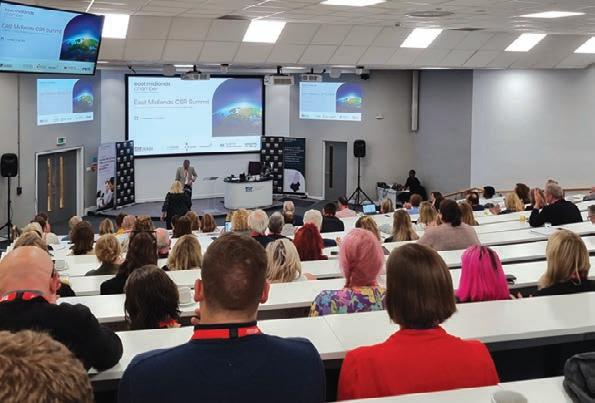
East Midlands CSR summit 2024 at the University of Derby
The 2025 East Midlands Chamber Sustainability and CSR conference is delivered in partnership with the University of Derby, and sponsored by Geo Green Power with support from Duncan & Toplis, Samworth Brothers, Viridis Net Zero and Spenbeck.
Through speakers, practical workshops and panel discussions, it will consider the key principles of CSR (corporate social responsibility) and sustainability through a “business-centric” lens – including how to align with a commercial imperative, business resilience and risk mitigation.
Chamber policy and representation manager Ian Bates, who is organising the 11 September conference, said: “As more businesses are looking to develop their sustainability and decarbonisation strategies it is critical to ensure that the right governance structures are in place.
“That is governance relevant to business size and sector which ensures responsible decision-making, ethical practices and accountability built into the business model, adding to, rather than distracting from your core strategy.”
Speakers on the day will include Dr Polina Baranova, associate professor of strategy and sustainability, University of Derby, Becky Valentine, sustainability & building health consultant and co-owner of Spenbeck, Dr Barbara Tomasella, from the University of Derby and Dr Elaine Conway, from Loughborough University, and Karen Holdsworth, community engagement lead at Samworth Brothers.
To hear about exhibition opportunities email policy@emc-dnl.co.uk and for tickets visit: is.gd/ATizTS

One of Leicestershire’s biggest employers has put millions of pounds into community initiatives in recent years, ranging from grants to get children active and eating well, through to fighting food insecurity and smartening up care homes.
Melton-based Samworth Brothers runs community schemes out of each of its 14 UK manufacturing sites, encouraging its 11,500strong workforce to put something back into the areas in which they work and live.
The £1.6bn turnover food-to-go giant is a huge player in the UK’s sandwich, savouries and ready meals markets and owns the Ginsters pasties, Soreen, Dickinson and Morris pork pies and Higgidy brands.
‘We often get asked by them what does the business do to give back, and over the past five years we’ve been doing it in a more coordinated and targeted way’
Community engagement lead Karen
Holdsworth told Business Network that the family-run business had always had a policy of giving something back where it could.
She said: “That’s something we have done right from when the business was founded, supporting the local community that our colleagues come from.
“It’s just always been part of our DNA, but we're doing a lot more of it now because there’s much more need for support.
“We’ve always done it for the right reasons, not just to tick a box, and one of the reasons to talk about it a bit more now is because it’s become important to many of the young people who are coming into the business.
“We often get asked by them what does the business do to give back, and over the past five years we’ve been doing it in a more coordinated and targeted way.”
Karen joined Samworth Brothers almost nine years ago and has been in her current
role for three years. The position was created following a big rise in demand for help during the pandemic.
Her roles include acting as one of the trustees of the company’s Community Opportunity Fund, which makes awards to help young people become more active or learn about food and nutrition – working with sports clubs and community groups in Leicestershire, Manchester, the Southwest and Brighton.
More than £155,000 was given out last year and in the first five months of this year that has risen to almost £300,000.
Karen said the fund – originally called the Sports Opportunity Fund – came about from the 2012 London Olympics when the then chief executive decided 1% of Samworth Brothers profits should go to good causes as a lasting legacy to get young people into sports.
She said: “We wanted to support up-andcoming clubs – the ones that are run by volunteers and parents who give up their spare time.
“We changed the name and brought in a whole set of new trustees last year – which I’m one of – and although it still supports sports projects, we widened the remit slightly to reach community groups doing cooking classes or offering help with food and nutrition.
“We’ve also helped community allotments that have youth projects attached to them and are teaching children about the value of growing and nurturing things that they can go away and eat. This year we’ve had three or four really fantastic projects come through –including one in Leicester that has just had £75,000 from the fund.”
Karen also leads Samworth Brothers’ Community Champions initiative, encouraging its staff to help those who are most at need in their communities – through fundraising, volunteering and charity support.
Those efforts focus on reducing food insecurity, improving health and wellbeing, skills development and career opportunities and last year led to 3,165 volunteering hours being given and £120,000 donated to charities.
She said Samworth Brothers sites each have a community champion helping oversee

volunteering and fundraising alongside their day job.
She said: “Every site does something different. Some might start off with a local litter pick, others might join together – for example, Walker and Son and Bradgate Bakery recently went to a local dementia care home and did up their garden for them. There's always something going on at site level.”
Alongside all that, £406,000 was raised by a Charity Challenge in the Lake District last year. That saw Samworth Brothers set up a base over two weekends, with a big marquee and teams of four competing in a nine-hour triathlon/orienteering event. There were 105 teams last year – including ones from clients such as Tesco, Marks and Spencer, and Sainsbury’s – supporting 75 charities.
At the end of each Saturday there was a meal prepared by Samworth Brothers chefs for all the competitors and volunteers. On the second Saturday, they invited a couple of

charities to join them – last year it was a domestic abuse charity from Kendal and a young person's homelessness charity. Each was given a surprise grant of £20,000.
Karen said the next Charity Challenge in May 2026 will take place in Castleton in the Peak District.
As an alternative to a Charity Challenge this summer, Samworth Brothers volunteers gave their time to transform an outdoor space at the Eyres Monsell Community Centre in Leicester into a garden and social hub for families to enjoy.
Karen said: “I always say you can’t do a job that involves the community sat behind a desk –I like to get out and see projects and meet with people and talk to them about what they’re doing. I’ve made some amazing connections. It’s a really nice world to be involved in.”
To find out more visit www.samworthbrothers.co.uk

The team at Geo Green Power say corporate social responsibility (CSR) and environmental, social and governance (ESG) have always been about much more than cutting carbon emissions.
When the specialist renewable energy installer was established in 2010, awareness of the climate crisis existed but lacked the urgency and global focus we’ve seen in recent years. Today, their growth and success have been driven by a focus on renewable energy’s ability to deliver not only carbon savings but also long-term commercial value.
Managing director James Cunningham argues that companies need to stay on track with CSR and ESG, which is one of the reasons they are sponsoring the Chamber’s Sustainability and CSR Conference 2025. He said: “When it comes to delivering Net Zero ambitions, carbon accounting and reduction can become the only focus, but emission reduction is never the only outcome. Projects that increase energy efficiency or reduce waste will cut carbon, but they will also save money, enhance your reputation, align with customer values and increase employee engagement.
“Investment in technologies such as solar PV exemplifies this win-win approach. Yes, they help reduce a business’s carbon footprint, but they also deliver other significant benefits such as considerable savings on bills.”
He said solar PV typically pays for itself within five years and provides long-term energy price security, helping companies plan confidently for the future.
Plus, with funding options such as power purchase agreements (PPAs), companies can reap environmental and financial benefits with no upfront cost.
He said: “Successful technologies such as solar have never been reliant on a singular benefit. This pattern applies across all elements of ESG and CSR; companies that embrace these practices at their heart don’t just produce policies that tick a box, they experience benefits that run deep through their organisations.
“Companies that work to reduce their impact on the environment or support local community initiatives often enjoy higher levels of employee engagement, especially if their employees have a say in selecting them. This engagement contributes to better talent retention and lower recruitment costs.
“Whatever is happening in the wider economy or political spheres, adopting sustainable practices won’t ever leave you at a disadvantage.”

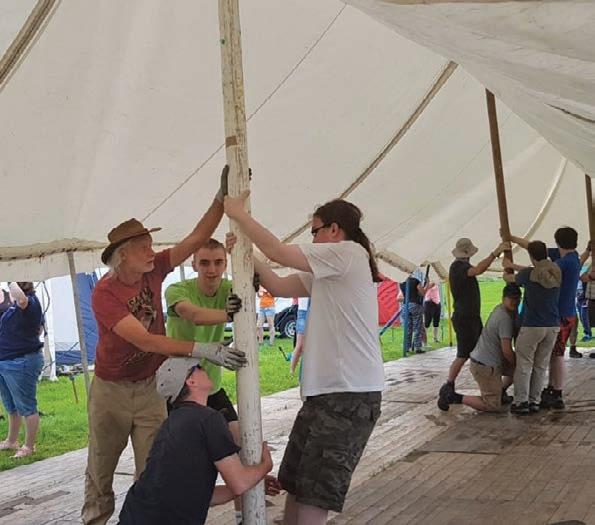
Helping the local community is part of the DNA of Howden’s Derby team. That’s why, in July, for the third year running, members of the kitchen specialist’s team will be helping to set up Derby Kids Camp – a summer initiative run by volunteers that for 50 years has been taking 70 disadvantaged city kids of primary school age across the school holidays to a rural residential retreat.
For a week at a time, these young people –many of whom have endured hardships, bereavement and immense challenges – are simply tasked with having fun, being carefree and trying new things.
Many have never been out of central Derby or seen a farm animal. But for one week they enjoy a host of activities, including swimming, hiking, time with animals, crafts, campfire activities and entertainers such as magicians and musicians.
‘It’s a bringing together of people of all skills, from all backgrounds that pull
together to produce this fantastic camp’
Over the last couple of years, staff from Howden’s Derby office have used some of their two annual “volunteer days” to help set up the camp.
The work includes rigging the tents – which come fully equipped with duvets, mattresses and other cosy additions to make each one feel homely – and putting together the kitchen.
Howden helpers have increased in numbers from seven in 2023 to an expected 12 this July, working across the two days before the first children arrive to stay in the field provided by one of the summer camp sponsors.
Howden account handler Nigel Pounder said: ‘It’s a bringing together of people of all skills from all backgrounds that pull together to produce this fantastic camp, ready to accept children for the summer and hopefully offer inspiration and a bit of respite from their day-to-day issues.’
Senior account handler Susan Rippin said: “Having volunteered before, I wanted to go back and help this year for a very worthwhile cause and very good day.”
Lee Parr, Derby branch director, said: “I’m excited to roll my sleeves up, grab a tent peg or two, and get stuck in with the team to set up the camp.”



Asuccessful initiative from the Leicestershire-based Randal Charitable Foundation has seen more than £200,000 distributed to 60-plus grassroots charities thanks to partnerships with six community foundations and umbrella organisations.
The foundation said the money is equal to 5-10% of each charity’s annual revenue, at a critical time when small charities face an increasingly challenging funding landscape, despite growing community needs.
Randal Foundation partner Community Foundations include:
• LoveBrum (Birmingham)
• MK Community Foundation (Milton Keynes)
• Foundation Derbyshire
• Northamptonshire Community Foundation
• Forever Notts (Nottinghamshire)
• Leicestershire & Rutland Community Foundation.
Dr Nik Kotecha OBE DL, chairman of the Randal Foundation, said: “These small charitable organisations frequently reach communities that larger institutions simply cannot access – building authentic relationships with vulnerable individuals and creating safe spaces where transformation becomes possible.
“The supported organisations represent what we describe as “small but mighty local groups” that often operate as unsung heroes within their communities.
“These voluntary organisations and charities provide direct support to the most
vulnerable residents and those facing extreme hardships.
“They deeply understand local needs and can often respond with remarkable expertise, agility and compassion, yet securing sustainable funding remains their greatest challenge.
“Government cutbacks, economic uncertainty and donor fatigue have created a perfect storm, where demand for services has surged, while financial resources have dwindled. Many small organisations now face existential threats despite their communities needing them more than ever.
‘Each
pound invested will ripple through their communities, creating impact far beyond what traditional metrics can capture’
"This is precisely why our Randal Foundation has established these initial six partnerships, which represent more than money – they are a belief in the power of local knowledge and grassroots innovation.
“Each pound invested will ripple through their communities, creating impact far beyond what traditional metrics can capture.
“By channelling resources directly to these local champions, we are not just providing financial support – we are validating their essential role in our social fabric and enabling

Loughborough University has been recognised as a University of Sanctuary thanks to its efforts to go “above and beyond” in providing a welcoming environment for refugees and those seeking asylum.
The status was awarded by City of Sanctuary, a charity that works with groups, organisations and individuals across every area and every sector in the UK to promote inclusivity, solidarity and compassion for people seeking sanctuary.
Membership recognises a commitment to creating a culture of safety, inclusion and support, which is central to a strategic focus of fostering ”vibrant and inclusive communities”.

including scholars from regions of conflict.
Support varies from financial help in the form of short-term fellowships or scholarships, to help with seeking accommodation, support with local community integration, language skills and access to learning and scholarly resources.
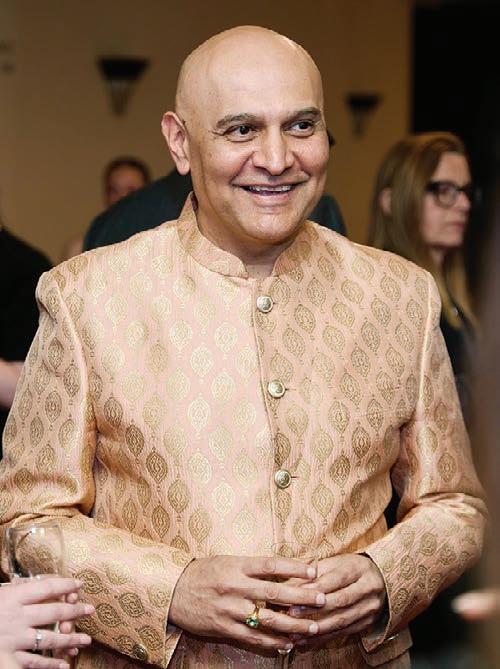
‘This award is a testament to the incredible work of our entire university community in creating a true culture of welcome’
Professor Malcolm Cook, chair of LUSARG –Loughborough University for Students and Academics At-Risk Group – said: “This award is a testament to the incredible work of our entire university community in creating a true culture of welcome.

sustainable community-led solutions for the long term.”
He said the partnership approach leverages the unrivalled knowledge that community foundations and locally based organisations possess about the community and social landscapes in their respective areas, with the goal of making the biggest impact for those most in need.
One example of how the collaborative approach works is through the partnership with the Northampton Community Foundation, where significant amounts have been awarded to 11 charities, aligning with the Randal Foundation’s strategy of providing healthcare for the vulnerable, tackling mental ill-health, alleviating poverty, prisoner rehabilitation and education for the most disadvantaged.
The Randal Foundation plans to continue its work of reaching as many national community foundations as possible – and is open to entrepreneurial and innovative ideas that deliver maximum impact where it is needed most.
www.randalfoundation.org.uk
“Our sanctuary scholars and students bring immense value to Loughborough, and I'm proud that we can offer them not just educational opportunities, but a genuine home where they can rebuild their lives and share their talents with us all.”
Sanctuary seekers and their families, as well as university teams including the Students’ Union, University Chaplaincy, the International Student Experience team and Global Engagement team, all worked closely on the University of Sanctuary submission, having each helped at-risk students at Loughborough.
LUSARG was set up to help at-risk students and academics from around the world –
It offers Sanctuary Scholarships to support prospective students, building on support offered to Ukrainian students launched in 2022.
In 2024, it awarded one undergraduate and two postgraduate scholarships – two were Ukrainian, and one was Nigerian.
Additionally, the Doctoral College offers two scholarships a year for PhD study to individuals who have experienced forced migration or are considered at risk in their home country. In the last three years, Loughborough University’s relationship with Cara (the Council for At-Risk Academics) has allowed it to offer sanctuary and support to academics from around the world.
One impactful initiative has been funding research fellows to collaborate with Loughborough academics on research challenges of mutual interest – often leading to joint funding applications.
The university has also twinned with Beketov National University in Ukraine as part of a Universities UK International initiative to enable campuses to stay open, academics to continue their teaching and research, and students to carry on their studies.


Imagine having nothing when you move into a new home. That is a reality for 8% of social housing tenants who even post-move find themselves living in “deep furniture poverty” –without three or more essential items.
Around 25% of all social housing tenants have some kind of furniture poverty, defined as the inability to afford the basic essential items that provide a household with a decent quality of life.
For East Midlands residents facing furniture destitution or furniture insecurity (without the money to replace anything essential that breaks), a team-up between housing provider emh and Coalville charity the Marlene Reid Centre means help is at hand.
Emh, which has 22,000 homes across the East Midlands, has joined forces with the charity to see donated furniture repurposed to help residents who are struggling to furnish their new home.
Pioneered by three members of emh’s graduate employee mentoring (GEM) programme – Matt Smith, Grace Nicholls and Becky Clarke – the project repurposes decent furniture from tenants who no longer need it or have left it after moving out. Struggling tenants are given vouchers to be redeemed in the

Marlene Reid Centre’s RESTORE and REST Furniture shops – which are further boosted by the Marlene Reid Centre – for essential low-cost items. So a £40 voucher can more than half the cost of a £75 sofa.
Since it was launched a few months ago, 15
vouchers have been issued and the partnership now has a container to store donated furniture.
Chan Kataria, chief executive of emh, said the GEM scheme was shaping the future leaders of the housing sector.
He said: “This project is a great example of our CSR work in action.
“As with so much of our social impact work, it has multiple benefit – in this case supporting the development of talented local employees giving them the opportunity to gain wider skills and connections, reducing poverty and helping the environment through the re-use of items which may otherwise have ended up in landfill.
“I’d like to thank Becky, Matt and Grace for their dedication to making this happen. In addition to gifting their time, we’ve also donated £1,000 to help the project get off the ground.”
Paul Fagan, general manager of the Marlene Reid Centre, said: “Both organisations share a number of key values and we hope that this partnership will lead to further joint projects.”
Chamber readers who have furniture to donate or know an emh tenant who could benefit can contact the Marelene Reid Centre at info@mrc.uk.net
Homelessness charity Framework relies on the contribution of hundreds of volunteers to support its work across Nottingham, Nottinghamshire, Lincolnshire, Derbyshire and South Yorkshire – from helping staff in frontline services to sitting on the board.
Those support roles include everything from befriending and mentoring people who are experiencing social isolation to administrative and reception duties, as well as helping service users take part in activities, courses and classes and, in particular, helping people to use digital technology.
In the 12 months to the end of March, more than 150 people took part in some kind of volunteering activity with Framework, including service users who find volunteering a good first step to getting back into work. They also include members of the public who want to give their time, and representatives of businesses and organisations who undertake specific projects and provide specialist expertise.
Nottingham-based PR consultant Liz Bee is one of those business, helping to spread the word and explain what Framework does.
Liz began providing pro bono support to Framework in 2023 as part of the corporate social responsibility work of Nottingham PR agency Redbrick Communications. Now leading Wonderbee PR, she continues to provide pro bono support worth the equivalent of £12,000 a year to Framework. As well as telling the story of what Framework does, Liz also ensures the charity gets coverage in local, regional and national press, and offers advice on crisis communications.
Since getting involved, she has helped publicise activities including the opening of new accommodation for homeless people, promoting the involvement of commercial partners such as

MAIN PICTURE: Framework deputy CEO Claire McConigle presents Beat The Street’s “thank-you” disc to DHP Family MD George Akins at Rock City
INSET: Liz Bee, Wonderbee PR. Credit Charlotte Jopling


Tesco and of Nottingham-based DHP Family, whose annual charity music festival Beat The Streets raises funds for Framework.
Liz said: “No one can have failed to see the growing number of people sleeping on the streets.
“Having seen firsthand how Framework is changing lives devastated by homelessness and giving people a chance of a better future, I wanted to help make a difference.
“I’m pleased to be working with the comms team at Framework to help shine a light on the
issues involved, and on the support needed to provide long-term sustainable solutions.”
Claire Eden, head of fundraising and communications at Framework, said: “We are a small team and financial resources are stretched to the limit, so we are particularly grateful to Liz for donating her time and expertise to help explain the challenges that so many people face and our work to support them.”
To help Framework visit: www.frameworkha.org/support-us/volunteer


Media students from West Nottinghamshire College have made a meaningful contribution to charity by producing a staff training video to support their work in schools.
Literacy Volunteers, a Nottingham-based registered charity, has been supporting children and families for years by promoting reading, communication and social skills development.
The charity, which has partnerships across Nottinghamshire and Derbyshire, relies on a dedicated team of volunteers who give their time each week to help young learners thrive.
Recognising a need to modernise their volunteer training materials, the charity turned to the college’s Level 3 advanced content, film and TV students, to bring their creativity and technical skills to the project.
The students filmed at St Patrick’s Primary School in Mansfield, capturing footage of a literacy volunteer reading with children. Interviews were also conducted with the volunteer and classroom teacher, who shared their positive experiences and the benefits of the programme.
Sue Marriott, lead volunteer co-ordinator at Literacy Volunteers, said: “The training videos were really out of date. We knew the students could
help bring a new energy and professionalism to them. The volunteers help children engage with reading through books, games, puzzles and even jigsaws. It’s all about building confidence, selfesteem, and a real love of learning.”
The students’ work will be used not only for volunteer training but also to promote the charity online and during volunteer recruitment events.
Student Luca Turner, who worked on the filming and editing, said: “The school kids were great, and really easy to work with. It felt good to create something that’s going to make a difference.”
Lance Hill (pictured) is chief executive of Nottingham print and direct mail specialist Eight Group.
At Eight Group we take CSR seriously and it is very much woven into our core values and general business practices.
As a certified B Corp organisation [meeting high standards of social and environmental performance, transparency and accountability] we have CSR policies integrated which sit alongside our ISO processes and policies which cover the four standards we hold for quality, environment, information security and health & safety.
I hold a firm belief that if you create a strong sense of purpose and values across the business it makes for a better place to work, and belong. Systems run businesses and building a solid CSR policy, or working practices that align to a strong CSR commitment gives you a great foundation for employees, customers and suppliers alike.
Rather than focus on the principles of what CSR is, I look at it differently. Do you want to be the best business you can be? Do you want to attract the best staff, and also customers? Do you care about the environment and being efficient? Do you want to be profitable and a responsible employer? Would you like to have a positive impact in your local area?
Clearly the answer should be yes to all of these, so rather than see CSR as a box-ticking exercise, which I think many business owners do, I look at it as a way to improve the performance of the business across every aspect. It’s kind of a no-brainer when you approach it like this.
buy into the overall culture and values we have created, as it is them who will ultimately benefit.

It’s very much a journey, not a destination. For example, on the sustainability and environmental front we are already a carbon neutral company, but we are working towards a Net Zero goal by 2030 and we have signed up to Science Based Targets (SBTi). Part of our journey includes solar panel installation at our Nottingham HQ later this year which will make a significant impact.
I’m constantly thinking about how we can improve, reward staff, increase our NPS, offer the best customer experience and more. Then we need to ensure all of our staff think similarly and
Our staff are very much on board with our CSR approach as they see the benefits directly, again thinking about environmental benefits they can utilise free EV charging at work, have access to a cycle-to-work scheme, plus salary sacrifice benefits for things like EVs or pension contributions.
There is more in the pipeline which will continue to build on what we have done already.

Urban regeneration is the process of revitalising an area to improve local infrastructure and, in turn, the quality of life for the people that live and work there. It can also help boost the local economy and create a more vibrant and sustainable environment. Business Network takes a closer look at the benefits and the types of urban regeneration.
Economic development: Urban regeneration can attract new businesses to an area, which creates local jobs and in turn boosts the local economy. Urban regeneration can also revitalise public spaces, creating parks, venues and cultural attractions, which can help bring in more tourism.
Social improvement: Improved infrastructure can have a massively positive impact for local communities. New and better facilities, such as schools, hospitals, community centres and libraries provide better access to education and healthcare and promote community spirit. Additionally, when people come together as a community, this can also lead to a reduction in crime and anti-social behaviour.
Environmental sustainability: Most urban regeneration projects have a strong focus on creating new or protecting existing green spaces, such as parks, woodlands and nature reserves. Investing in green spaces can help improve air and water quality, while also having a positive effect on health and wellbeing.
Community engagement: Regeneration projects often call for the views and opinions of the public at all stages, from initial consultation to design and implementation. This gives the local community a chance to have a say in what the area will look like, ensuring the project meets the needs of the people who live there. As regeneration is not a one-size-fits-all solution, strategies must be tailored to each area and the unique challenges that are presented.
Heritage preservation: Urban regeneration plays an important part when it comes to preserving local history and culture. Historic buildings can be adapted to suit the



changing needs of an area, while listed facades can be implemented into the design of new buildings – preserving the past, while looking to the future.
Redevelopment of brownfield sites: Transforming vacant industrial land into new residential, commercial, or recreational spaces. Areas of brownfield land are often contaminated from their former uses. The regeneration of brownfield land to green infrastructure can reduce the environmental health risks associated with the area.
Densification: The act of constructing new housing units or redeveloping existing structures at a higher density than current exists in the area. The goal is to accommodate more people or activities within a limited geographical area, while promoting a more efficient use of land.
Intensification: Put simply, intensification is about maximising the potential of a site or building by increasing its capacity or output. This could be achieved by adding more floors to an existing building, converting a warehouse into residential units or increasing the number of businesses in a commercial area.
Creating public spaces: Developing parks, plazas and mixed-use spaces, that can be enjoyed by the public. Public spaces can also be designed to accommodate local events, such as festivals, concerts and regular market days, helping to foster a thriving cultural scene.
Improving public transportation: Creating pedestrian and cycling infrastructure, such as dedicated cycle lanes, improving existing public transport hubs and building new railway stations and bus stops.
‘Improved infrastructure can have a massively positive impact for local communities’







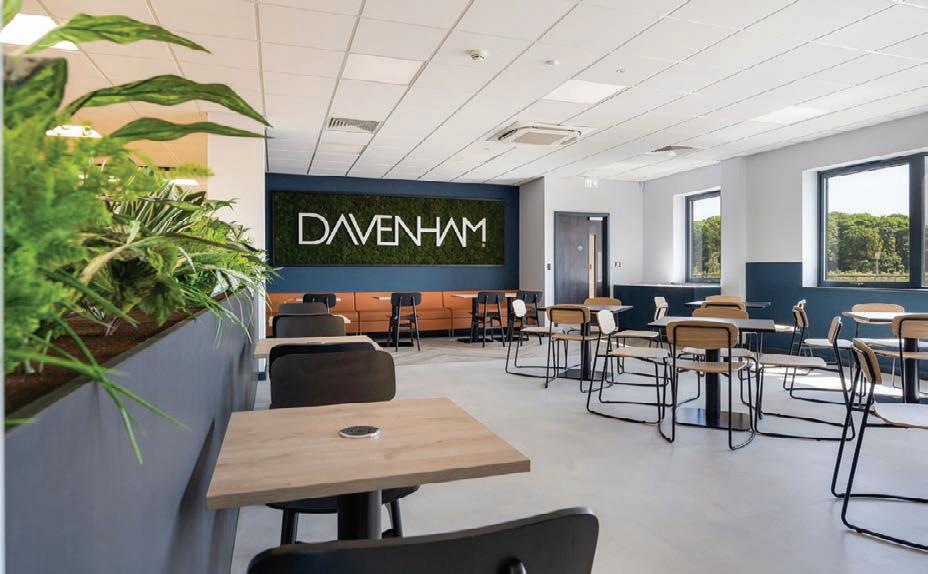
At Davenham, as well as being a brand of Legrand, an established global leader in electrical and digital building infrastructure, you’ll be supported by a close-knit, agile team working on cutting-edge switchgear for some of the world’s biggest tech companies.
We are proud of our Dublin roots, where we were founded 40 years ago, but now we embark on our next chapter – setting our sights on making Nottingham and the Midlands the centre for AI and data centre excellence.
If you are a SKILLED ELECTRICAL ENGINEER, PANEL WIRER or MANUFACTURING ASSISTANT, wanting to immerse yourself in the exciting and evolving data centre sector, get in touch with us: davenhamswitchgearlimited.talosats-careers.com/vacancies.
Or, if you are an APPRENTICE WANTING TO BEGIN YOUR CAREER WITH US, get in touch by emailing talent@davenham.com to register your interest for September.


When it comes to regeneration projects, brownfield land has enormous potential. But what exactly does it mean, and what are the benefits - and the challenges? Business Network takes a closer look.
In England, brownfield land is defined as ‘previously developed land that is no longer being used’. This typically means land that formally housed factories, offices or industrial estates (though it doesn’t include agricultural buildings or farmland, mineral mines, landfills and recreational ground).
Brownfield land offers huge potential, especially when it comes to housing. Building houses on brownfield land reduces the amount of countryside that is lost to housing developments. Brownfield land is plentiful across every region in England. Greenfield land, in contrast, is limited, and protecting what remains of it can help reduce carbon emissions and improve air quality, while supporting natural habitats and protecting wildlife.
There is also political imperative for maximising the use of brownfield sites for urban regeneration projects. The government is committed to providing much needed homes in a housing shortage. However, in addition to houses, brownfield sites can also be used to build commercial or renewable energy projects.
Brownfield registers were introduced in 2017. Local authorities must keep up-to-date public records of brownfield sites suitable for housing redevelopment. Entries on the register must:
• Be an area capable of supporting five dwellings
• Be suitable for residential development
• Have no legal or ownership constraints
• Be achievable within 15 years.

Inclusion on the register doesn’t necessarily mean a brownfield site has planning permission. However, in 2024, the government made it easier for local councils in England to prioritise brownfield developments, with the aim to speed up the process allowing developers to get the green light to build.
While building on brownfield land has many benefits, there are many challenges that developers may have to navigate. These include: Road access: Brownfield land can often be located in areas with limited vehicular access or road networks unsuitable to support heavy plant traffic. Building road access can add to the overall cost of the project, as well as slow down work.
Ecology and habitats: Land that has gone unused for generations may now be home to protected species not found anywhere else. If there is the potential for the development to disturb this ecology, planning permission may not be granted.
Heritage: Some sites may be part of the local heritage of the area or include structures or geographical features with historical significance, such as listed buildings or facades. These can be sympathetically incorporated into new buildings, but great care will have to be taken to properly protect these original structures.
Contamination: Some brownfield land might be at risk of contamination, especially if it was used for industrial purposes. Surveys for dangerous chemicals such as asbestos, lead and fuel will have to be conducted and, if found, will need to be cleaned up before building work can commence.
‘Building houses on brownfield land reduces the amount of countryside that is lost to housing developments’








A school coding initiative has relocated from Bolsover to Bradford to be part of the Yorkshire city’s 2025 UK City of Culture celebrations.
The Junction Arts programme This Girl Codes was designed to inspire and empower women and girls in STEAM (science, technology, engineering, arts and maths) subjects, helping break barriers and spark creativity.
Electrical engineer Ann Fomukong-Boden and Junction Arts project manager Jemma Burton have now collaborated with Bradford Digital Creatives and Belle Vue Girls’ Academy to deliver a Microbit coding workshop – where students programme their own radiotransmitted patterns, fusing technology and artistic expression.
The students have also had the opportunity to learn about other careers combining technology and creativity.
These coding projects will culminate in a light installation, forming part of an exhibition, ReelBFD: Digital Arts, Bradford Stories, which is running at the National Science and Media Museum this summer.
Leicester-based cyber security business KIT365 has launched a podcast called Strictly Cyber, to help organisations protect themselves from the growing wave of cyber threats.
Designed specifically for SMEs, the series will cut through technical jargon to deliver clear, practical advice on the online threats facing businesses today.
Hosted by the KIT365 team, it will explore real-world security issues, from phishing scams and ransomware attacks to safeguarding remote workforces and meeting evolving compliance demands.
KIT365 founder and director Rob Kneller said: “Our goal is to make these topics accessible, relatable and, most importantly, actionable for every business owner and leader out there.”
Strictly Cyber can be streamed on YouTube and on podcast platforms.


Cass Vranjkovic, lead technology specialist at IT support group NetMonkeys, says “digital labour” can save your business time and resources.
Every business leader feels the pressure to do more with less. A new work trend index report highlights this “capacity gap,” revealing that while 53% of leaders demand higher productivity, 80% of the workforce feel they lack the time or energy.
The solution emerging is a new kind of resource, the AI Agent – an AI system that can reason, plan and act on its own. This creates a strategic shift. While traditional software competes for technology budgets, AI agents are framed as “digital labour,” competing for the much larger headcount budget.
‘Leaders should begin identifying clear, repetitive roles where automation can add immediate value’
The report confirms this, noting that for some roles the next new hire may not be a person, but a digital colleague. This isn’t a future fantasy – 87% of UK business leaders expect to use agents to expand their workforce within the next 18 months.
This change is creating a new type of business, the “Frontier Firm” or “AI First” – powered by hybrid teams of humans and agents.
Building one, however, requires a new mindset from leadership.
The research reveals a crucial gap – 67% of leaders are familiar with agents, while only 40% of their employees are. As leaders, it is our responsibility to bridge this divide and guide our teams through this evolution. We must become “agent bosses,” learning to delegate to and manage our new digital colleagues effectively.


It is telling that the top priority for leaders is now upskilling their existing workforce, recognising that human skills are more critical than ever.
For businesses here in the East Midlands, the time to strategise is now. Leaders should begin identifying clear, repetitive roles where automation can add immediate value, treating these agents like new digital employees. The goal is to find the optimal balance between automated efficiency and the irreplaceable human judgment, creativity and oversight that drive real value.
Being an AI First company isn’t about replacing people with technology but enabling your current workforce to be 10-times more productive.
The question for every business leader is no longer if this change will come, but how you will lead it.
Nottingham print and direct mail specialist Eight Group has invested £1.2m in equipment including a flagship Konica Minolta’s print press at its production facilities in Glaisdale Parkway.
Management said it was the first time a AccurioJet KM-1e digital B2 inkjet press had been installed at a UK print business, enabling it to offer customers “exceptional print quality and colour accuracy as well as impressive sustainability credentials” – and saving around £125,000 a year in outsourcing costs.
The company has also invested in an additional Konica Minolta AccurioPress C12000e production printer, along with AccurioPro Flux
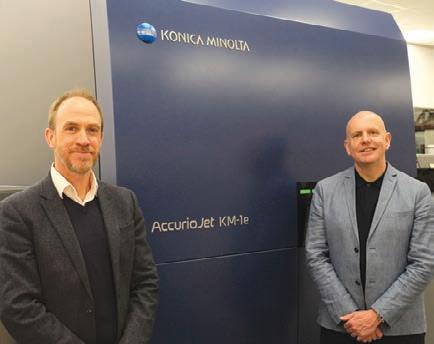

print management software.
The investment gives it greater production flexibility and increased capacity, allowing the company to explore new areas of business
beyond its core direct mail offering including personalised packaging, retail printing, and broader commercial print options.
Eight Group chief executive Lance Hill said: “This AccurioJet digital press enables us to produce exceptional quality, short-run, large format work in-house, which we previously outsourced to subcontractors.
“We have greater control of production whilst keeping more revenue in-house, better utilisation of our equipment, and enhanced speed to market, along with topquality results across a wide range of materials. We now have an entire digital print line powered by Konica Minolta.”








Laws governing how wills are produced and executed haven’t changed for almost 200 years. Daniel Edwards (pictured, inset), partner and head of inheritance and trusts disputes at Nottingham-based Browne Jacobson, considers proposed changes.
The Wills Act was passed in 1837, just two weeks after Queen Victoria ascended to the throne.
As in any common law system, the law has developed over the centuries, with various cases creating new rules or interpreting old ones.
While “old legislation” is not a good reason for reform in itself, the scale of societal change over such a vast amount of time has driven a consensus that the time has arrived for a comprehensive review of the law on wills.
‘The time has arrived for a comprehensive review of the law on wills’
The review has been led by the Law Commission, an independent body established to make recommendations to the government on law reform in England and Wales.
Since 2016, it has led a project examining the possibility of reform to various parts of law relating to wills in England and Wales, with the aim of:
• Supporting the exercise of testamentary freedom – or in other words, to ensure people’s wishes are carried out after their death wherever possible.
• Protecting those making wills, especially from fraud or undue influence.
• Increasing clarity and certainty in the law.
On 16 May, the commission published its recommendations for reform of the law on wills. It has proposed many changes, but some are particularly noteworthy. Currently, the test for whether a person has the mental capacity necessary to make a will is from an 1870 case. It has been refined over the 155 years since, but it remains


the foundation stone for disputes over capacity of a testator.
This is despite the fact that since 1870, another mental capacity test has been passed into law, this time by means of statute – which has sometimes created confusion and uncertainty. The Law Commission’s report recommends the test set out in the Mental Capacity Act 2005 should apply to all assessments of testamentary capacity, which seems a sensible step to make matters more straightforward.
The Wills Act contains very strict requirements for the signing and witnessing of a will – if they are not complied with to the letter, a will is not valid, regardless of how minor the error may seem, and regardless of the consequences.
While this creates certainty, it sometimes leads to results that feel unjust – and mean if a will is invalid as a result, and a previous will, or an intestacy, will take effect.
The report recommends courts be given the power to make an order providing that an otherwise invalid will be treated as if it was valid –assuming the court is satisfied the testator’s “clear and genuine” intentions can be ascertained.
It is currently the law that a marriage revokes a will, unless the will is specifically made “in the contemplation of pending marriage”. This is a rule a lot of people do not know exists. It is also one that can seem a little hard to justify, given changes in society since the rule came about.
The rule can also be open to abuse. In cases of “predatory marriage”, a will – which perhaps leaves everything to the testator’s children – would in all likelihood be revoked by a marriage.
If that person does not then make another will, on their death their estate would pass by the laws of intestacy, which could result in their spouse receiving their entire estate –or at least the majority of it.
So the report has recommended this rule is abolished, such that marriage has no effect on a previously made will.
Law Commission reports can take years to be considered and debated in Parliament, but given the government has issued a response to the recommendations, there is perhaps motivation for the report and accompanying legislation to be debated soon.
The Freeths’ housebuilding and strategic land team continues to solidify its position in the sector following successes with five big housebuilders.
This includes reappointments to the legal panels of Bellway and Keepmoat in late 2024, appointment to the Taylor Wimpey panel early this year, and starting work for both Hill Group and Berkeley Group most recently.
Freeths said it has maintained a 100% panel reappointment success rate for several years, continuing its long-established position with major housebuilder names such as Barratt, Bellway and Keepmoat.
In more recent years, the firm has had new panel appointments to other significant housebuilder giants – including Vistry and social housing panels including Longhurst/Amplius, Cottsway HA and CHIC Framework.
Freeths’ dedicated team covers all aspects of housebuilding, from land acquisition and planning to construction and sales.
Management said it is now the biggest B Corp law firm in the UK, committed to upholding the highest standards of social and environmental impact, which closely aligns with the top housebuilders and their stakeholders.

Partner and national head of housebuilding and strategic land Patrick Adie (pictured) said: “It’s an incredibly exciting time to be in this sector, with significant government focus on driving forward real change through the planning system and a huge increase in investment in social housing.
“We look forward to continuing to support our clients across the sector in achieving their strategic goals in the years ahead.”

Ateam from Dains Corporate Finance advised the shareholders of Meet and Engage (M&E) on its successful sale to Unseen Group (Gradtouch Limited).
The Dains team was led by Chris Matthews and Victoria Tunaley from the corporate finance and tax advisory teams respectively.
Leicester-based M&E provides a technology platform to help big corporates manage their recruitment and graduate programmes.
After receiving investment from Pelican Capital in 2024, Unseen has completed four strategic acquisitions, and Meet & Engage is the 10th organisation overall to join the group.
Ali Hackett, co-founder and managing director of Meet and Engage, who remains in her role
following the acquisition, said: “This marks an exciting opportunity not just for our clients – who will benefit from greater access to cutting-edge thinking and solutions – but also for our team, who now have even more scope for career development and fresh perspectives.
‘Dains have been a trusted advisor from our inception back in 2015’
“Dains have been a trusted advisor from our inception back in 2015 to today taking care of all our day-today accounting needs while providing specialist advice on a variety of projects over the years.
“That advice has continued all the way through to today where


Business decision-makers are becoming ‘paralysed’ by constant crisis – and their excessive caution is limiting growth opportunities, a new report from accountancy and business advisory firm BDO has warned.
In total, 84% of international business leaders surveyed as part of BDO’s annual Global Risk Landscape Report 2025 said the global risk landscape is now, more than ever, defined by crisis.
In response, executives are taking a much more defensive approach, with more than two thirds (69%) saying their companies are either “risk averse” or “risk minimising”, a rise from 61% last year.
Only 7% of executives said their risk management was “very


and simple way to understand.”



Chris Matthews, corporate finance associate director at Dains said: “It’s been a pleasure to help the shareholders of M&E in getting their sale agreed with Unseen Group (Gradtouch).”
The shareholders of M&E were advised by Alex Clifton of BHW Solicitors.
proactive”, down from 19% in 2024 and 29% 2023. The report found that top six fears keeping business leaders up at night were regulatory risk, concerns over supply chains, recruiting and retaining talent, geopolitical tensions, environmental issues and cybercrime.
While regulators are demanding ever-more information about risks, some executives (39%) agreed that this had a positive impact in helping to make companies safer, but a larger proportion (57%) said regulatory demands were only “somewhat” helpful in reducing company risk profiles.
However, CEOs surveyed were critical of compliance overspend, suggesting that current risk management strategies are failing to deliver value.
Trusha Lakhani (pictured) started her career as a finance director and now supports SMEs at Great Business Matters.
Trusha Lakhani’s career is rooted in her drive to empower businesses as a NED, board advisor and executive coach.
Currently a global council member of the ACCA (Association of Chartered Certified Accountants), she works alongside the executive teams to shape strategic initiatives for accounting professionals on a global scale.
She has also had roles as a chair of its Leicestershire panel board (raising more than £10,000 for local charities), and as a member of ACCA’s national corporate sector and on the board of ACCA’s international assembly.
While her professional work speaks volumes, Trusha’s efforts during the pandemic showcased her compassionate leadership.

Amid the challenges of lockdown, she provided free advice to business owners grappling with uncertainty, directing them to resources that helped keep their operations afloat.
Since 2021, she has served as a trustee for Bamboozle Theatre, supporting children with severe learning difficulties through creative and engaging opportunities.
She is also an integral part of Ada Lovelace CiC in Hinckley, championing STEM education and contributing to the local community through supporting the planned installation of the inspiring Ada Lovelace statue.
She also served as a governor at North Warwickshire and South Leicestershire College for five years.
Trusha’s work highlights the impact that professional expertise and personal dedication can have on supporting others – whether it’s sitting on the board to drive international strategies or volunteering her time to empower communities, her efforts reflect the importance of balancing professional success with social responsibility.


Leicester College has invested in a Green Technology Hub to prepare students for the green revolution under way within the construction industry.
The facility will promote the new generation of green technology focused on efficiency and sustainability –and methods that construction professionals can use to lessen the use of energy, water and even materials.
The hub will allow the college to showcase emerging technologies to help students and employers learn green leadership skills and gain practical expertise.
State-of-the-art green tech equipment in the hub includes air source heat pumps, solar panels, battery storage systems and EV charging stations.
College student Jack Hine is on T-Level work experience with Lewin Electrical Services, which helped with the fit-out. He is studying renewable energy as part of his training.
‘The new Green Tech Hub will provide students with a strong foundation to learn more’
He said: “I’ve been learning about insulation, trunking and wiring, as well as other systems and techniques. I think the adoption of green technologies will help to expand the construction industry.”
College construction area manager Nick Allen said: “Green technology is already having, and will continue to have, an increasing impact on the UK construction sector.
“It’s vital that our students have access to this equipment to learn how to use the technology and understand the impact it will have when they get into the workplace.”


Digital design students at West Nottinghamshire College brought the imaginations of schoolchildren to life in their annual Monster Project.
Pupils from Abbey Primary School, in Forest Town, Mansfield, joined students in the college’s Create Theatre on its Derby Road campus to see their drawings of monsters adapted onto the big screen. Earlier in the year the pupils were challenged to come up with imaginative monster illustrations using pencils, paint or crayons.


Loughborough University has been awarded £20,000 to create a new technical apprenticeship role, which it hopes will help to tackle the ageing workforce in the field of physics.
The university cited data suggesting 45% of technicians supporting physics research and teaching activities within UK universities are aged 51 or over – risking a lack of future technical skills needed to meet the growing demands of the sector.

Digital arts and games design students at the college were then tasked with bringing the drawings to life in animations. Using both traditional media and technical software, students put together an animated showreel of the monsters and invited the pupils in to see the finished film.
Student artist Aaliyah Smith introduced the screening to teachers, parents and children, which was followed by a presentation of each artwork, presented by the student artists.
Abbey Primary teaching assistant Kate Somervile said: “The animations were absolutely fabulous. I couldn't have imagined how these could have gone from 2D pictures which the children created into something that’s 3D. The responses from the children were brilliant and their faces were absolutely alive with joy.
‘The project presented a creative challenge, which the students embraced’
“It was wonderful to see the interactions with the students who created the film. I thought that was a really lovely relationship that was built from visiting us at the school to then us being invited into the college to see the final product.”
Digital Arts teacher Brian Wilson said: “Working with the school was an absolute pleasure, and the opportunity to showcase the students' animations to a live audience was so rewarding.”
The Research England-funded UK Institute for Technical Skills & Strategy (ITSS) – which provided the funding – has partnered with the Institute of Physics and Engineering and Physical Sciences Research Council to unlock future careers for new physics technical apprentices nationally.
Julie Turner, strategic scientific technical lead at Loughborough, said: “It is wonderful to see our technical tutors coming together to put in a successful bid to ITSS for a physics apprentice to
join our successful Loughborough University technical apprenticeship scheme.
“The Loughborough technical apprenticeship scheme is co-led by technicians across the university and is attracting and inspiring new and diverse colleagues into technical careers.”
Dr Kelly Vere MBE, director of the ITSS, said: “We are excited to invest in young technical talent to accelerate the number of technical apprentices being recruited into physics technical apprentice positions.”
By Andrew Parr, director, The Growth Collaboration
In today’s fast-paced and competitive business landscape, small and medium-sized enterprises (SMEs) across the East Midlands face a silent threat: hidden operational inefficiencies. These inefficiencies, embedded in manual tasks, disconnected systems, and outdated processes, quietly erode profit margins as well as hinder growth. Unlike visible expenses, such inefficiencies can disrupt supply chains, delay deliveries, and undermine competitiveness.
The East Midlands’ strategic location, with its extensive road, rail, and air networks, makes it a powerhouse for logistics, manufacturing, and retail. Major distribution centres in Leicestershire and Derbyshire rely on efficient supply chains to meet customer demands. However, inefficiencies like manual inventory tracking or fragmented systems can lead to costly delays, overstocking, or stockouts. For example, a logistics firm might face increased fuel costs due to outdated route planning, while a retailer could lose sales due to stock discrepancies. In a region where logistics is a cornerstone of economic activity, these hidden costs can be particularly damaging.
With over 30 years of experience in supply chain and operational improvement, I’ve seen how these inefficiencies impact businesses. A multi-site retailer struggled with independent point-of-sale systems, resulting in hours of manual data compilation and errors. The current economic climate amplifies these challenges. Inflation, a tight labour market, and rising customer expectations demand agility, yet many SMEs are held back by reactive workflows. PostBrexit trade complexities, such as border delays and fluctuating raw material costs, have further strained logistics operations.
For East Midlands businesses, staying competitive requires optimising supply chains to minimise disruptions and maintain customer satisfaction. Without intervention, hidden costs can escalate, threatening profitability and growth.
At The Growth Collaboration, we help SMEs uncover and eliminate these hidden costs through a structured, collaborative approach. We start by observing daily operations and asking probing questions to identify inefficiencies. Then, we co-create a tailored roadmap for efficiency and growth, ensuring solutions fit your business. Our “No Savings, No Fee” model ties our success to yours – we only get paid based on the savings we deliver, ensuring you invest in impactful solutions. However, we don’t just implement quick fixes; we build capability within your team,
fostering a culture of continuous improvement. This way, the improvements we make are sustainable and become an integral part of your business operations.
Our consultancy is grounded in integrity, innovation, and a commitment to sustainable growth. We don’t just recommend solutions; we implement them to fit your business, ensuring lasting results.
Our consultancy also fosters a culture of continuous improvement. By training staff, encouraging cross-departmental collaboration, and establishing key performance indicators, we ensure sustainable results. For example, lean logistics principles, such as just-in-time inventory, helps SMEs minimise costs while maintaining flexibility. This approach is particularly valuable in navigating disruptions like demand spikes or supplier issues.
If your business faces operational bottlenecks, inventory issues, or growth challenges, let’s talk. Don’t let hidden costs hold you back – take the first step towards operational excellence today.
Our team is ready to deliver solutions as unique as your business.
Visit www.thegrowthcollaboration.co.uk or email andrew.parr@thegrowthcollaboration.co.uk to learn how we can help uncover and eliminate hidden costs with practical, jargon-free advice.


Aretail marketing specialist has taken a complete building at the city councilrun Dock workspaces in Leicester.
Array UK, which works with global brands such as L’Oreal, Maybelline, Givenchy and Boots, has taken the 17,000 sq ft Dock 4 office building on the complex north of Leicester city centre.
The business employs 87 people in the UK and was previously based in Leicester’s Friars Mill Business Centre, which is managed by East Midlands Chamber.
‘It’s not just about filling spaces; it’s about fostering the right business environment’
It joins inaugural tenants Kazzoo IT Solutions, Somerbys IT, IN Focus ITS, Employee Zero, World Products, Translatr, Impact Venture and The VoIP Shop, building on a strong roster of occupants at Dock 3-5 which will contribute to the Dock development housing more than 120 businesses and more than

600 employees once fully occupied.
The Dock estate is part of the Space City Enterprise Zone and is positioned alongside the National Space Centre and Leicester University’s research and development campus.
Leicester mayor Sir Peter Soulsby said: “I’m delighted to welcome this award-winning business – Array UK – to join the
mix of other innovative businesses in our latest Dock workspace.
“Achieving 40% occupancy in just nine months is a testament to the quality of serviced workspace that is being offered here.”
Array chief executive Anthony Gosse said: “We are pleased to have found the right place to further strengthen our presence in the UK and EMEA. Our Leicestershire hub plays a key role
in driving sustainable and innovative retail solutions for our clients.”
Crystal Carter, workspace development manager at Dock, said: “It’s not just about filling spaces; it’s about fostering the right business environment. Our team is dedicated to helping tenants thrive while contributing to Leicester’s Net Zero ambitions and a more sustainable future.”

Derby’s redeveloped Victorian Market Hall (pictured) drew in more than 34,500 visitors in its first three days.
The grand opening saw thousands of visitors from across Derby and beyond queuing outside Osnabruck Square to be among the first to step into the historic Grade II listed building.

The iconic Olivetti Building in Derby – one of four similar 1970s buildings in the UK – is up for sale, presenting what has been described as a “rare opportunity for investors, developers or businesses seeking a striking headquarters premises in a strategic East Midlands location”. The building was designed by architect Edward Cullinan for the Italian typewriter manufacturer Olivetti, in a modernist style and forward-thinking open-plan layout.
In recent years, the 1.02-acre site has been modernised and repurposed by Fresh Logistics, a UK temperature-controlled courier

service. Company founder Alan White acquired and redeveloped the site in 2015, transforming it into a logistics hub while preserving its architectural integrity.
He said: “We’ve always seen the Olivetti Building as more than just a workplace – it’s a piece of design history.
“We’ve invested in making it both functional and inspirational, blending heritage with highperformance business infrastructure. Now it’s time for the next chapter.”
Salloway Property Consultants is acting as the agent and inviting offers in the region of £1m.
The occasion was marked with a ribbon-cutting ceremony by council leader Councillor Nadine Peatfield, and the new mayor of Derby, Ajit Atwal – nearly 159 years since the Market Hall opened its doors in 1866.
Cllr Peatfield said: “We can be proud that Derby Market Hall is now a vibrant destination with live entertainment, pop-ups, bars and incredible dining options.
“By giving people so many reasons to visit there really is something for everyone, and Derby’s Market Hall is truly thriving once again.
“This is a big catalyst moment in Derby’s ongoing regeneration efforts. The impact on the entire city that 34,500 additional visitors has had shows that the decision to invest in our most cherished heritage building was an important one.
“Going forward, the Market Hall will contribute significantly to the local economy, generating over £3.5m for the local economy every year.”





I’ve always liked heated seats, and coupled with air conditioning, they’ve been a godsend in the dark throws of winter. Maybe it’s my advancing years, but I recently had a decent trip down south, and the weather was so cold, that I was thankful for the constant heat spreading up my back.
When the traffic ground to a halt however, a few electric cars around me I’m sure were looking at their battery miles slowly dwindling.
No such fuss with the Juke – I had the engine running all the time and the heating cranked up with a full tank of fuel.
I was in the latest petrol/hybrid version of the compact SUV Juke, and it came with a whole raft of kit as standard.
It’s always been a popular model since its inception 14-years ago. Sales have been boosted by a few design tweaks here and there, and a remastered interior. The hybrid version here is only available in the


high-end models and brings together a 94-horsepower 1.6-litre petrol engine with a 48horsepower electric motor to power the front wheels working with a somewhat clever “multimodal” automatic gearbox.
One has an e-pedal setting for increased regenerative braking so there’s always a good reserve of charge allowing it to move away in EV mode and up to 35 miles on electric power, as long as you keep a gentle foot on the accelerator. There are three driving modes –Normal, Sport and Eco – with the latter best used on a good motorway outing.
On the inside, things have been smartened up, the highlight being Bose speakers built into the front seats, and the sound quality is studio–like.
I really enjoyed its company over the week, it’s a somewhat forgotten gem in a car park full of “ordinary”, and it’s built in the factory up the road in Sunderland.

‘There are three driving modes – Normal, Sport and Eco – with the latter best used on a good motorway outing’




In today’s increasingly volatile and unpredictable economic environment, is it becoming more challenging for organisations to truly practice corporate social responsibility?
Some would certainly say “yes”. When you have ever-increasing costs, onerous regulation, increasing employee demands and international competition, the CSR agenda perhaps becomes more difficult to prioritise.
With many organisations today navigating challenging financial climates, it’s understandable that focus may shift inward and toward short-term priorities as they work to adapt and build resilience.
However, I would argue that any business that has truly integrated social and environmental concerns into its strategy and operations will continue to see the value.
These businesses will have taken their operations to the next level – upgrading their corporate social responsibility to environmental, social and governance (ESG) where it is all about accountability, not just good intentions.
What do I mean? ESG is more structured and measurable, building on the groundwork that CSR has provided. Here are some of the differences.
CSR
• Is voluntary and values-driven.
• Focuses on philanthropy, community and ethics.
• Is harder to measure, as it is often more qualitative.
• Is mainly linked to reputation and doing good.
ESG
• Is data, investor and market-driven.
• Focuses on environmental impact, social responsibility and governance structures.
• There are clear metrics, standards and reporting frameworks (such as GRI, SASB and TCFD).
• Includes risk management, compliance and long-term value creation.

Environmental,
social and governance (ESG) is effectively taking corporate social responsibility (CSR) to the next level


• A sound ESG strategy can provide a competitive advantage and enhance brand reputation. Customers prefer brands that are trustworthy, operate with purpose and are seen as part of the local and global community. They are seen as companies that care – about employees, customers and suppliers as well as the communities within which it operates.
• Ethical business practices contribute to employees feeling valued, leading to improved retention, motivation and well-being. Fair and honest dealings with all stakeholders, employees, customers and supply chains bring a level of loyalty, sense of purpose and support.
• Environmental practices that are wellconsidered and aligned to core business can
reduce operating costs and promote sustainability positively.
• Good quality ESG practices will reduce regulatory risks arising. This is achieved through the very nature of having proactive measures and standards in place to address the potential social and environmental impact.
• There are also philanthropic aspects – whether by giving money (donations), or time (volunteering) or sharing your talent or promoting/endorsing others. All of these activities will reflect back on the business positively if they are carried out with honesty and integrity.
Of course, there are some perceived disadvantages:
• CSR or moving to ESG can appear costly and take up time and energy.
• It can be seen as a distraction.
• It could be viewed externally that the organisation is only paying lip service to CSR which is why ESG is now where businesses need to be operating, as it is evidence and data driven.
These disadvantages are usually due to the activities related to social, environmental impact not being aligned to the business and integrated into its overall operational strategy – as an afterthought, that is considered optional or an add-on.
I would argue that investment into your business’ ESG is an essential part of developing and growing a business that makes a difference on a much wider footing.
It is even more important in today’s turbulent world that we undertake that wider consideration around our environmental, social and governance responsibilities and become accountable for our actions.
This will ensure our communities and the world we live in can all thrive collectively.
If you need any support understanding how to ensure your CSR strategy is optimally aligned to your business then please do contact the Chamber for a discussion.

